Middle East Film Festival (New Orleans) USA
Wednesday, March 26, 2008
NEW ORLEANS MIDDLE EAST FILM FESTIVAL
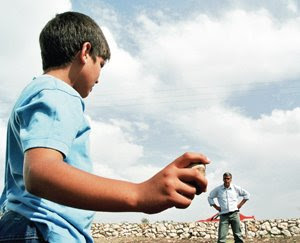
The second annual
NEW ORLEANS MIDDLE EASTERN FILM FESTIVAL
August 1 through 10 , 2008
Presented by Zeitgeist Multi-Disciplinary Arts Center
www.zeitgeistinc.net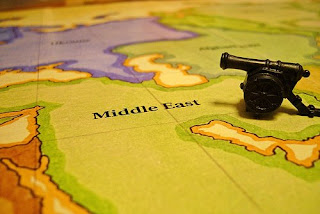
_______________________________________________________________
AUDIENCE AWARD WINNERS:
BEST SHORT: BE QUIET by Sameh Zoabi (Palestine/France)
BEST DOCUMENTARY: THESE GIRLS by Tahani Rached (Egypt)
BEST FEATURE FILM: CAPTAIB ABU RAED by Amin Matalqa (Jordan)
________________________________________________________________
Zeitgeist Multi-disciplinary Arts Center
www.zeitgeistinc.net
presents
2nd NEW ORLEANS MIDDLE EAST FILM FESTIVAL
http://nolamideastfilmfest.blogspot.com/
AUGUST 1 through 10, 2008
All events @
ZEITGEIST MULTI_DISCIPLINARY ARTS CENTER
1618 Oretha Castle Haley Blvd.
(in the Saturn Screen Printing Building, between Euterpe & Terpsichore, across from Café Reconcile)
(504) 827-5858 recording (504) 352-1150 real person zte@bellsouth.net
In any writing or screenwriting class you quickly learn that the most important element to any good story is conflict. In the Middle East, conflict is a more abundant natural resource than even oil. Curated by Rene Broussard, this remarkable program of films will explore the extremely rich and complex history, politics and culture of this volatile region. Acclaimed and Award-winning new films from or about Egypt, Iran, Iraq, Israel, Jordan, Lebanon, Palestine, Syria, Turkey, and the United Arab Emirates will be shown over ten amazing nights including food, music, and visual art.
Sponsored by the NEW ORLEANS PALESTINE SOLIDARITY, NEW ORLEANS INTERNATIONAL HUMAN RIGHTS FILM FESTIVAL, NEW ORLEANS CHARITABLE FILM NETWORK, ARAB FILM DISTRIBUTION / TYPECAST FILMS, WOMEN MAKE MOVIES, NEW ORLEANS CONSULATE DE FRANCE, KRUZ BOUTIQUE, CAFÉ ARABESQUE, ARTEEAST and ZEITGEIST INC.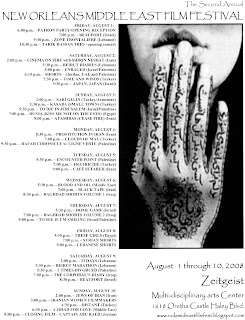
click on the image to your left to enlarge and copy the festival flyer. Please print it and feel free to post it or send it to everyone you know.
_______
2nd NEW ORLEANS MIDDLE EAST FILM FESTIVAL:
FRIDAY, AUGUST 1:
6:00 p.m. – PATRON PARTY/OPENING RECEPTION catered by Café Arabesque.
7:00 p.m. – BEAUFORT (Israel)
9:30 p.m. – ZONE FRONTALIERE (Lebanon) with visiting experimental French filmmaker Christophe Karabache
10:30 p.m. – TARIK HASSAN TRIO - opening night party/jazz concert
SATURDAY, AUGUST 2:
2:00 p.m. – CINEMA ON FIRE with SHIRIN NESHAT (Iran)
3:30 p.m. – BEIRUT DIARIES (Lebanon)
5:00 p.m. – ENRAGED (Israel/Palestine)
6:15 p.m. – SHORTS – A FEW CRUMBS FOR THE BIRDS (Jordan), WET TILES (United Arab Emirates), TRANSIT and BE QUIET (Palestine)
7:30 p.m. – TIME AND WINDS (Turkey)
9:30 p.m. - JAPAN, JAPAN (Israel)
SUNDAY, AUGUST 3:
2:00 p.m. – SARI GELIN (Turkey/Armenian)
3:30 p.m. – KASABA (SMALL TOWN) (Turkey)
5:30 p.m. – TO DIE IN JERUSALEM (Israel/Palestine)
7:00 p.m. – DUNIA (KISS ME NOT ON THE EYES) (Eqypt)
9:00 p.m. – ATASHBAS (CEASE FIRE) (Iran)
MONDAY, AUGUST 4:
5:30 p.m. – PROSTITUTION IN IRAN (Iran)
7:00 p.m. – CLOUDS OF MAY (Turkey)
9:30 p.m. – RAFAH CHRONICLE with LIGNE VERTE (Palestine)
TUESDAY, AUGUST 5:
5:30 p.m. – ENCOUNTER POINT (Palestine)
7:00 p.m. – FRATRICIDE (Turkey)
9:00 p.m. – CAFÉ SATERAH (Iran)
WEDNESDAY, AUGUST 6:
5:30 p.m. – BLOOD AND OIL (Middle East)
7:00 p.m. – BLACK TAPE (Iran)
8:30 p.m. – BAGHDAD SHORTS VOLUME 1 (Iraq)
THURSDAY, AUGUST 7:
5:30 p.m. – HOME GAME (Israel)
7:00 p.m. – BAGHDAD SHORTS VOLUME 2 (Iraq)
9:00 p.m. – TO SEE IF I’M SMILING (Israel/Palestine)
10:30 p.m. – BUFFALO CLOVER (from Nashville) with the ROVEN CIRCUS – Non festival Concert/Happening
FRIDAY, AUGUST 8:
5:15 p.m. – CAIRO AS SEEN BY CHAHINE plus THESE GIRLS (Eqypt)
7:00 p.m. – SYRIAN SHORTS – BEFORE VANISHING; WE WILL LIVE TO SEE THESE THINGS plus NOT A MATTER OF IF BUT WHEN (Syria)
9:00 p.m. – LEBANESE SHORTS - I SWAM IN THE SEA LAST WEEK; FROM BEIRUT WITH LOVE; (AS IF) BEAUTY NEVER ENDS...; SAVING FACE plus AFTER SHAVE (BEYROUTH APRES-RASAGE)
10:30 p.m. – CHRIS BECKER PRESENTS (an evening of original music to silent short films by NY and N.O. filmmakers)
SATURDAY, AUGUST 9:
2:00 p.m. – 33 DAYS (Lebanon)
3:30 p.m. – BEIRUT MARATHON (Lebanon) with visiting filmmaker Deborah Harse.
5:30 p.m. – 3 TIMES DIVORCED (Palestine)
7:00 p.m. – THE CORPORAL’S DIARY; ALLAHU AKBAR plus AMER & NASSER (Iraq)
8:30 p.m. – BEAUFORT (Israel)
SUNDAY, AUGUST 10:
2:00 p.m. – JEWS OF IRAN (Iran)
3:00 p.m. – IRANIAN WOMEN FILMMAKERS with SHIRIN NESHAT (Iran)
4:30 p.m. – DISTANT (Turkey)
6:30 p.m. – A JIHAD FOR LOVE (Middle East)
8:00 p.m. – CLOSING FILM – CAPTAIN ABU RAED (Jordan) - Audience Award winner - Sundance 2008
10:00 p.m. - AUDIENCE AWARDS CEREMONY - RECEPTION
___________
2008 FILMS IN CHRONOLOGICAL ORDER:
Friday, August 1 @ 7:00 p.m. plus Saturday, August, 9 @ 8:30 p.m.
BEAUFORT by Joseph Cedar. 
Winner Silver Bear Award at the Berlin Film Festival and a Best Foreign Language Academy Award 2007 nominee. Lebanon in the year 2000. Beaufort, is a military base kept by the Israeli army. This heavily guarded post has been here since the war in Lebanon in 1982. It is a symbol not only of Israel's most controversial campaign for military control of Lebanon, but also of a sacrificial struggle during which many soldiers lost their lives. On the evening of May 24th, the base was destroyed, blown up by thousands of mines. The powerful explosion marked the end of 18 years of Israeli occupation. The film tells the story of Liraz Liberti, the 22-year-old commander of Beaufort, and his troops during the last few months prior to their withdrawal. (Israel/Lebanon, 125 mins.)
Friday, August 1 @ 9:30 p.m.
ZONE FRONTALIERE (BORDER ZONE) by Christophe Karabache.
Lebanon, in the aftermath of the war of July-August 2006. A journey between Beirut and the South shows bodies going through suffocation, political crisis and uncertain chaos. Border Lines of a war…suspended. A waking up in the ruins. Sleepwalker in blood. Check point / territory / Shelter / bombs. Beirut…fragments of frontage. Division, scission, skeletons of cement, corpses cut down. A Human cry from the debris. A beautiful and poetic film. Experimental filmmaker Christophe Karabache will present his film (pending a visa from the U.S. government). Sponsored by the New Orleans Consulate de France. (Lebanon, 45 mins.)
You can checkout an english language translation of Christophe's complete filmography at http://babelfish.yahoo.com/translate_url?tt=url&trurl=http%3A%2F%2Fwww.etna-cinema.net%2Fkarabache.php&lp=fr_en&.intl=us&fr=yfp-t-309
Saturday, August 2 @ 2:00 p.m. & Sunday, August 10 @ 3:00 p.m.
SHIRIN NESHAT. 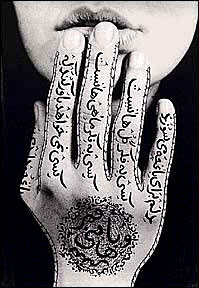
A profile of the acclaimed photographer, filmmaker, and video artist, Iranian-born Shirin Neshat addresses the complex forces shaping the identity of Muslim women throughout the world and explores the social, political, and psychological dimensions of women’s experiences. Shirin Neshat is scheduled to come to New Orleans as part of PROSPECT ONE in November. (Iran, 30 mins.)
Saturday, August 2 @ 2:00 p.m.
CINEMA ON FIRE by Mark Cousins. These two documentaries look at the international success of Iranian cinema. Cinema on Fire features filmmakers Abbas Kiarostami (A Taste of Cherry), Jafar Panahi (The White Balloon), Dariush Mehrjui (The Cow) and Bahraim Beizai (Bashu, The Little Stranger). (Iran, 45 mins.) Screens with SHIRIN NESHAT (Iran, 30 mins.)
Saturday, August 2 @ 3:30 p.m.
BEIRUT DIARIES by Mai Masri. Noted Palestinian filmmaker Mai Masri presents an eye-opening documentary centered on the women who staged a sit-in after the assassination of former Prime Minister Rafiq Hariri. (Lebanon, 80 mins.)
Saturday, August 2 @ 5:00 p.m.
ENRAGED: ISRAELIS RESISTING OCCUPATION by Eyal Eithcowich. 
"Enraged" follows a group of Jewish-Israeli activists who refuse to sit back while the occupation continues. They bring food into Palestinian villages under curfew, tear down parts of the separation barrier, and serve as human shields for Palestinian demonstrators. In Israel they are ostracized; in Palestine they endure a similar fate to that of the Palestinians—they are beaten, sprayed with tear-gas, and shot at with rubber-coated bullets. One such bullet hits one of the film's main characters, a 16 year old boy from Tel Aviv, in the head, permanently impairing his eyesight. The heroes of "Enraged" jolt viewers out of their passivity, forcing them to ask: what can I do to end the occupation? (Israel/Palestine, 58 mins.)
Saturday, August 2 @ 6:15 p.m.
SHORTS: A FEW CRUMBS FOR BIRDS directed by Nassim Amaouche. (Jordan) WET TILES (U.A.E.), TRANSIT and BE QUIET (Palestine). (see individual film descriptions by country below)(63 mins. TRT)
Saturday, August 2 @ 7:30 p.m.
TIME AND WINDS by Reha Erdem. 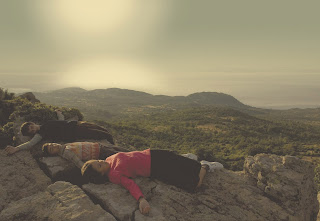
A small, poor village leaning over high rocky mountains, facing the immense sea, flanked by olive yards. Villagers are simple and diligent people who struggle to cope with a harsh nature. They earn their living, on a daily survival basis, out of the earth and of the few animals they feed. They live according to the rhythm of the earth, air and water, day and night and seasons. The daily time is divided into five parts by the sound of the call to prayer. Every day, all human events are lived through within these five time slices. In child raising, grownups go on with the practice they have experienced by their parents. They expose their love awkwardly and consider beating a favorable method. Fathers always prefer one of their sons. Mothers command their daughters ruthlessly. Ömer, Yakup and Yildiz, three children of about 12,13 years old, just between childhood and youth, are the prominent characters in this movie of five times. Ömer, the son of the imam, wishes hopelessly for the death of his father. When he understands that wishful thinking does not have any concrete results, he begins to search for childish ways to kill his father. He shares his guilty thoughts with his friend Yakup. Children study in the village school consisting of only one classroom. Families show their gratitude to the young woman teacher by giving her presents -the bread they cook themselves, the milk of their own sheep. Yakup is in love with his teacher. He hides his guilty feelings even from his best friend Ömer. When some day he sees his father spying the teacher, he dreams, like Yakup, of killing his father. Yildiz both studies and tries to manage the household works imposed by her own mother. She tries to be a mother for her baby brother. On the other hand, she learns with irritation about the secrets of the relationship between men and women. Five times elapse. Children, oscillating between rage and guilt, grow up slowly. (Turkey, 111 mins.)
Saturday, August 2 @ 9:30 p.m.
JAPAN, JAPAN by Lior Shamriz. 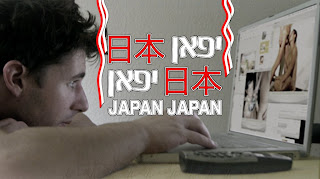
Imri, a handsome, gay, nineteen-year-old, ex-soldier moves to Tel Aviv but dreams ultimately of moving to Japan. For the time being, however, he settles into an apartment, complete with an oddball roommate, and toils away at a random job. In his off hours, he cruises for boys, investigates the scene, and religiously surfs porn, which invades the film, creating an exotic, sexually graphic cyberspace landscape in parallel existence with Lior’s more mundane everyday existence. Japan Japan admirably crams more male nudity and cinema theory into its first sixty seconds than any film you’ve ever seen (unless you are a really major porn aficionado). Semi-improvised but immediately and viscerally accessible, Japan, Japan signals Lior Shamriz and lead actor Imri Kahn as ones to watch. (Israel, 65 mins.)
Sunday, August 3 @ 2:00 p.m.
SARI GELIN: THE TRUE STORY by Ismail Umaç. One of the major conflicts/debates in the middle east is the question of the Turkish/Armenian Genocide. To people on both sides of the debate it is one that provokes great passion, extreme pain and ultimately affects their national identity. To some it is a question of semantics, what constitutes a massacre vs. what constitutes a genocide? Presented by the Turkish American Association of Louisiana. (Turkey, 70 mins.)
Sunday, August 3 @ 3:30 p.m.
KASABA (SMALL TOWN) by Nuri Bilge Ceylan. 
KASABA describes relationships between members of a Turkish family in a small town. The first part is in a primary school where the family's 11-year-old daughter is a pupil. It shows the social environment to which she has to adopt, and its difficulties. The second part is in spring. We see the girl with her brother, who is four years younger, and their journey to the cornfield where their family are waiting for them. In the third part the brother and sister witness the complexities and darkness of the adult world... The fourth part takes place at home. This is a tranquil sequence moving between reality and dream. (Turkey, 85 mins.)
Sunday. August 3 @ 5:30 p.m.
TO DIE IN JERUSALEM by Hilla Medalia. Rachel Levy, a 17 year old Israeli, was killed in Jerusalem by a Palestinian suicide bomber, Ayat al-Akhras, also 17, a schoolgirl from a Palestinian refugee camp several miles away. The two young women looked unbelievably alike. The film unabashedly explores the Palestinian-Israeli conflict through the personal loss of two families. (Israel/Palestine, 76 mins.)
Sunday, August 3 @ 7:00 p.m.
DUNIA (KISS ME NOT ON THE EYES) by Jocelyn Saab. 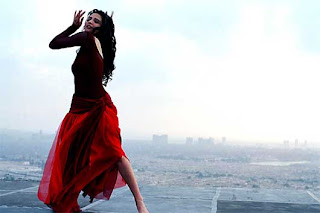
Dunia is an Egyptian woman in her early twenties whose mother was a famous belly dancer. Dunia has inherited her mother's beauty and talent, but is also keenly intelligent and is studying toward a master's degree in literature. Dunia is swept off her feet by Mamdouh, a handsome young man who values her intelligence and independence. However, when Dunia marries Mamdouh, his attitude abruptly changes as he makes it his mission to stifle her forthright nature. (Eqypt, 110 mins.)
Sunday, August 3 @ 9:00 p.m.
ATASHBAS (CEASE FIRE) by Tahmineh Milani. 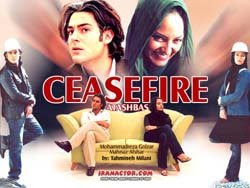
In this romantic comedy, an attractive young married couple with money to burn snipe at each other, destroys the house, run each other off the road and nearly divorce, this irreverent romantic comedy, spiced with saucy dialogue is the biggest box office hit in Iranian cinema history. (Iran, 90 mins.)
Monday, August 4 @ 5:30 p.m.
PROSTITUTION BEHIND THE VEIL by Nahid Persson. The film is a sympathetic portrait of the two women working as prostitutes in a country that prosecutes adulterers with capital punishment. To buy sex and still comply with Muslim law: men can marry the women in what is called "Sighe," a temporary marriage sanctioned in Shia Islam. Sighe can last from two hours up to 99 years. (Iran, 58 mins.)
Monday, August 4 @ 7:00 p.m.
CLOUDS OF MAY by Nuri Bilge Ceylan. 
This May in the small town seems to be warmer and gloomier than the previous years. Still, everyone seems to be happy despite their small worries and lives closed for any surprises. However, this happiness is a little disturbed by the arrival of Muzaffer who has made up his mind to shoot a film in this town where he had passed his childhood. (Turkey, 130 mins.)
Monday, August 4 @ 9:30 p.m.
RAFAH, CHRONICLE OF A CITY IN THE GAZA STRIP by Stéphane Marchetti & Alexis Monchovet. 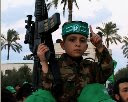
A close quarters portrait of the Palestinian city in the course of a year of upheavals (12 September 2005 - 12 September 2006). Rafah is located in the southern Gaza Strip. It’s a city cut in two by the Philadelphia Road, a security corridor between Sinai and Gaza. Screens with the animated short LIGNE VERTE (Palestine, 56 mins. TRT)
Tuesday, August 5 @ 5:30 p.m.
ENCOUNTER POINT by Ronit Avni & Julia Bacha. The story of an Israeli settler, a Palestinian ex-prisoner, a bereaved Israeli mother and a wounded Palestinian bereaved brother who risk their safety and public standing to press for an end to the conflict. A film about hope, true courage and grassroots peace efforts. (Palestine, 85 mins.)
Tuesday, August 5 @ 7:00 p.m.
FRATRICIDE by Yilmaz Arslan. 
Semo, is a Kurdish immigrant and pimp living in Germany. His younger brother Azad is in an asylum for refugees where, amidst hopeless squalor he befriends Ibo, an eleven-year-old orphan, also Kurdish. A powerful and tender bond grows between the two boys, but the odds are against them. Ahmet and Zeki are young second-generation Turks. Frustrated, unemployed, and alienated from their heritage they devote themselves to petty crime and their savage pit bulls. When these doomed exiles meet, their encounter unleashes a nightmarish cycle of violence. (Turkey, 92 mins.)
Tuesday, August 5 @ 9:00 p.m.
CAFE SETAREH by Saman Moghadam. 
The itch for change felt by three women living in a poor Tehran neighborhood is palpably expressed in this multi-award winning finely nuanced film. The rare film equally influenced by Quentin Tarantino, Jean Renoir and William Saroyan, this time-winding triptych has a deep humanist sense and a feel for working-class folk whiling away the hours. The film also reminds that, in a country theoretically oppressive of women's full expression, Iranian cinema is second to none as a delivery vehicle for rich dramas about women. Three women in an old district of Tehran face challenges. Fariba supports herself and family by managing a small cafe in the district with no support from her jobless, debauched husband. Young and beautiful Saloomeh dreams of marrying Ebi. She wants for more comfortable life, but Ebi, a mechanic, cannot even pay for a wedding or apartment. Moluk, a middle-aged woman, has fallen for a younger man, but... (Iran, 102 mins.)
Wednesday, August 6 @ 5:30 p.m.
BLOOD AND OIL by Jeremy Earp. The notion that oil motivates America's military engagements in the Middle East is often disregarded as mere conspiracy theory. Blood and Oil, a new documentary based on the critically-acclaimed work of Nation magazine defense correspondent Michael T. Klare, challenges this conventional wisdom to correct the historical record. (US/Middle East, 52 mins.)
Wednesday, August 6 @ 7:00 p.m.
BLACK TAPE: A TEHRAN DIARY, THE VIDEOTAPE FARIBORZ KAMBARI FOUND IN THE GARBAGE by Fariborz Kamkari. 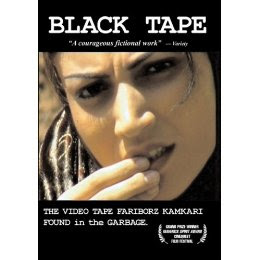
Banned in Iran this experimental film uses fictionalized, grainy, home video footage to tell the story of the abusive relationship between a successful middle aged Iranian businessman and his 18 year old wife, Goli. She has just received a camcorder as his birthday present and the entire story is told from the view of this camcorder. Goli has lived with him and been his sex slave since he took her captive as a nine year old from her family in the Kurdish rebellion. She is now pregnant. As she starts to talk back to him, he discovers that she has learned English and started to read. He must now make her a prisoner in his home. (Iran. 83 mins.)
Wednesday, August 6 @ 9:00 p.m.
BAGHDAD SHORTS COLLECTION - VOL. 1
These five short films were made by students at the Independent Film & Television College of Baghdad between the end of 2004 and May of 2007. Each piece offers viewers a window into the life of ordinary Iraqis during this extraordinary and turbulent time. Documentary Course - March, 2006 . Director Kamal documents the lives of his fellow college students as they enroll in classes and face the challenges of filming in the war-torn streets of Iraq. Hiwar . Opened in 1992, the Hiwar Center is a gathering place for artists, musicians and filmmakers. This wonderful short work showcases the center and explores its role as a vibrant meeting-place in the heart of Baghdad. Dr. Nabil . A committed surgeon and father, Dr. Nabil works at a small, understaffed Baghdad hospital suffering from a lack of equipment and medicine. Though other doctors have been killed or have fled the country, Dr. Nabil has decided to stay. Baghdad Days. This video diary chronicles Hiba Bassem's first year in Baghdad as she searches for a place to live, looks for work, attends college, deals with family problems and struggles to come to terms with her position as a woman living on her own. Thinking About Leaving . Living in a house with her sisters, mother and brother without electricity and surrounded by constant danger, director Hiba Bassem ruminates about what the past three years have brought to those who are living in Iraq. (Iraq, 87 mins.)
Thursday, August 7 @ 5:30 p.m.
HOME GAME by Yaron Shane. "Home Game" documents the story of graduating 12th graders, from the Israeli settlement of Netzer Hazani, during their last vacation before adulthood. Their yearly summers usually focused on the annual youth final four basketball competition. Yet their 2005 summer vacation turned into something else entirely because the Israeli government began to implement its plan to remove them from their homes in Gush Katif, Gaza, as part of the Middle East peace process. Instead of just competing on the basketball court they were also forced to compete on their 'home' court as well. This is a documentary about the teenage years, growing up and the youth who were forced to deal with a confusing reality that potentially harmed their whole system of beliefs and values. On the day all Israeli civilians were ordered to leave Gush Katif, high school students from Netzer Hazani held their final basketball game, which would decide the tournament. "Apparently someone above intended it to be that way," a Gush Katif resident in the movie said. "There are still many people who won't allow themselves to feel sympathy for the families of Gush Katif," Avi Abelow, the film's producer added that the film's aim was to "put aside political views, and to start to understand who these people are." (Israel, 83 mins.)
Thursday, August 7 @ 7:00 p.m.
BAGHDAD SHORTS COLLECTION - VOL. 2
These six short films were made by students at the Independent Film & Television College of Baghdad between the end of 2004 and May of 2007. Each piece offers viewers a window into the life of ordinary Iraqis during this extraordinary and turbulent time. Staying. The Dora District of Baghdad was once a lively area full of palm groves and people of all kinds, but that all changed with the US invasion of Iraq. Leaving . Bahram Al Zuhairi's powerful film documents an Iraqi family's painful journey as they sell their personal effects and make the dangerous trip to their new home in Syria. Omar Is My Friend. A student at Baghdad University, Omar also works as a taxi driver to make ends meet for his family. Here he discusses various hardships facing Iraqis today. Let the Show Begin . Preparation and staging of the Baghdad International Short Film Festival is the subject here. This cultural event moved foward in spite of formidable obstacles. A Stranger In His Own Country. A refugee from Kirkuk living in a camp outside Kerbala, Abu Ali struggles to survive and provide for his family under the difficult circumstances they now face there. The Shabandar Cafe. A cultural landmark in the old center of Baghdad, the cafe had been a gathering place for Iraqi intellectuals for years. Sadly, it was destroyed by a car bomb in 2007. (Iraq, 106 mins.)
Thursday, August 7 @ 9:00 p.m.
TO SEE IF I’M SMILING by Tamar Yarom. 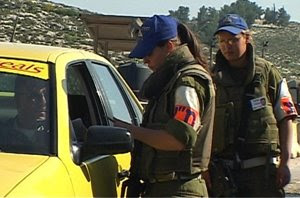
Israel is the only country in the world where 18-year-old girls are drafted for compulsory military service. In this award-winning documentary, the frank testimonials of six female Israeli soldiers stationed in Gaza and the West Bank pack a powerful emotional punch. The young women revisit their tours of duty in the occupied territories with surprising honesty and strip bare stereotypes of gender. (Israel/Palestine, 59 mins.)
Special Added Attraction:
The New Orleans Middle East Film Festival joins in mourning the passing of director Youssef Chahine, one of the Arab World's most influential filmmakers and a treasure of international cinema.
World-famous Egyptian filmmaker Youssef Chahine, whose career as director spanned nearly six decades, died July 27th at his home in Cairo, Egypt at the age of 82. Born in Alexandria, Egypt on January 25, 1926, Chahine studied at Alexandria University for a year before moving to the USA to study acting at the Pasadena Playhouse. Returning to Egypt, Chahine turned his attention to directing, making his film debut with BAB AMIN [Papa Amin] in 1950. He received his first invitation to the prestigious Cannes Film Festival with his second feature, IBN AL-NIL [Nile Boy], in 1951. Youssef Chahine's 1954 classic, SIRA' FI AL-WADI [The Blazing Sun] featured the film debut of Omar Sharif, whom Chahine had discovered in a Cairo cafe. In 1958, Chahine himself starred alongside Hind Rostom and Farid Chawki in BAB EL HADID [Cairo Station], a noir-like thriller involving the working-classes in Cairo's main railway station. Other career highlights include the popular epic films AL NASSER SALAH AD-DIN [Saladin] in 1963 and AL-ARD [The Land] in 1969, along with AL-ASFUR [The Sparrow] in 1973 and the semi-autobiographical, Fellini-influenced ALEXANDIRA TRILOGY, which includes the award-winning ISKANDARIYAH...LIH? [Alexandria... Why?] from 1978, HADDUTA MISRIYAH [An Egyptian Story] from 1982 and ISKANDARIYAH KAMAN WA KAMAN [Alexandria, Again and Forever] from 1989, for which Chahine again stepped in front of the camera as actor. In his later years, Chahine remained as busy as ever, directing AL-MISSER [Destiny] in 1997, SKOOT HANSAWWAR [Silence, We're Rolling] in 2001 and a coda to his ALEXANDRIA TRILOGY called ISKANDARIYAH, NEW YORK [Alexandria, New York] in 2004. He also contributed short films to international multi-director projects such as LUMIERE AND COMPANY in 1995 and 11'09"01-SEPTEMBER 11 in 2002. Chahine's last feature, HEYA FAWDA [This Is Chaos] was nominated for the Golden Lion at the Venice Film Festival in 2007.
A prolific, creative and hardworking director, Youssef Chahine will be remembered not only for his imaginative, music-filled works that entertain audiences even as they examine the social and political issues of Egypt, but also for his role in bringing Egyptian cinema to the attention of appreciative moviegoers all around the world.
So in tribute to YOUSSEF CHAHINE the New Orleans Middle East Film Festival and Arab Film Distribution/Typecast Films respectfully present his seminal documentary CAIRO AS SEEN BY CHAHINE.
Friday, August 8 @ 5:15 p.m.
CAIRO AS SEEN BY CHAHINE a documentary by Youssef Chahine. 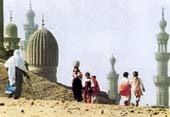
This concise masterpiece began as a commission by French TV for the news series Envoyé Spécial. Using his unique sense of artistic digression, Chahine transforms this portrait of a city into a self-portrait of a filmmaker. (Egypt, 21 mins.) Screens with THESE GIRLS (Egypt, 58 mins.)
Friday, August 8 @ 5:15 p.m.
THESE GIRLS by Tahani Rached. 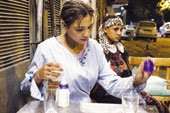
This fresh, irresistibly lively and intensely engaging documentary follows a band of teenage girls living on the streets of Cairo. Rached won astonishing access to the girls’ world; this vigorous, cinematic film is built upon the deep trust of its subjects and the long experience of the filmmaker. Already at a disadvantage as impoverished and abused girls in a Muslim society, they encounter rape, drug addiction, prostitution, pregnancy and motherhood on the streets. While the girls’ troubles are not downplayed, neither are their courage, playfulness and vibrant camaraderie. Rached brings alive the pulse of Cairo’s streets, offering an unsentimental portrait that avoids traps of guilt or cheap pity. What stands out is the strength and sheer joy that these girls project. With deft skill Rached reveals an invisible world and offers a loving homage to the inspirational, fierce girls who inhabit it. (Eqypt, 68 mins.)
Friday, August 8 @ 7:00 p.m.
SYRIAN SHORTS: BEFORE VANISHING directed by Joude Gorani. WE WILL LIVE TO SEE THESE THINGS and NOT A MATTER OF IF BUT WHEN by Julia Meltzer & David Thorne. (see description of individual films listed by country below) (77 mins. TRT)
Friday, August 8 @ 9:00 p.m.
LEBANESE SHORTS: I SWAM IN THE SEA LAST WEEK directed by Nesrine Khodr; FROM BEIRUT WITH LOVE by Wael Noureddine; (AS IF) BEAUTY NEVER ENDS... by Jayce Salloum; AFTER SHAVE by Hamy Tamba; SAVING FACE by Jalal Toufic. (see description of individual films listed by country below) (80 mins. TRT)
Friday, August 8 @ 7:00 p.m.
SYRIAN SHORTS: BEFORE VANISHING directed by Joude Gorani. WE WILL LIVE TO SEE THESE THINGS and NOT A MATTER OF IF BUT WHEN by Julia Meltzer & David Thorne. (see description of individual films listed by country below) (77 mins. TRT)
Saturday, August 9 @ 2:00 p.m.
33 DAYS by Mai Masri. 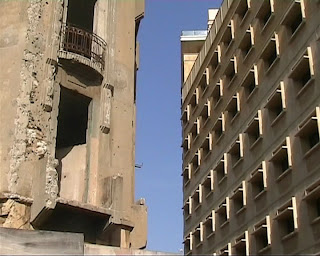
Filmed during the massive Israeli attack on Lebanon in 2006, 33 Days chronicles the lives of four young people working in theatre, media and emergency relief. (Lebanon, 70 mins.)
Saturday, August 9 @ 3:30 p.m.
MARATHON BEIRUT, For the Love of Lebanon by Deborah Harse. 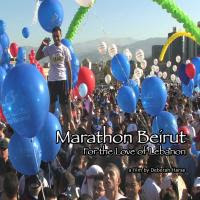
A documentary that was shot mostly in November-December 2006. A marathon in the aftermath of the war with Israel was an ardent metaphor for perseverance. Despite all the political upheavel, the Beirut Marathon Association chose to carry on with the event as a testament to the resilience of the Lebanese people. But just 5 days before the race, a government minister, Pierre Gemayel, was assassinated. After much deliberation, they decided not to cancel. Filmmaker Deborah Harse will be here to introduce the film. (Lebanon, 80 mins.)
Saturday, August 9 @ 5:30 p.m.
3 TIMES DIVORCED by Ibtisam Salh Mara'ana. How does a Palestinian woman in Israel survive an abusive husband? When Gaza-born Khitam’s abusive Arab Israeli husband divorces her and gains custody of her six children, she suddenly finds herself fighting two heart-breaking battles: against the Sharia Muslim court to get her children back, and against the state of Israel, which considers her an illegal resident and denies her protection in a shelter for battered women. (Palestine/Israel, 74 mins.)
Saturday, August 9 @ 7:00 p.m.
THE CORPORAL’S DIARY by Patricia Boiko & Laurel Spellman Smith. 
Jonathan Santos, 22, documented his 37 days in Iraq on video and in writing; never knowing that day 38 would be his last. From high explosives to clandestine home brew, his video footage and witty narrative combine personal musings on life, death, and the future he imagined but would never see. Through Jonathan’s handwritten words and videotape, the film tells a personal and profound story. Screens with ALLAHU AKBAR plus AMER & NASSER (Iraq,70 mins.)
Saturday, August, 9 @ 8:30 p.m.
BEAUFORT by Joseph Cedar. (Israel/Lebanon, 125 mins.)
Sunday, August 10 @ 2:00 p.m.
JEWS OF IRAN by Ramin Farahani. This film takes you on a rare journey through Iran's Jewish communities from Tehran to Isfahan, and finally to Shiraz, where an infamous case against jews accused of spying for Israel took place. (Iran, 52 mins.)
Sunday, August 10 @ 3:00 p.m.
IRANIAN WOMEN FILMMAKERS by Hamid Khairoldin & Majid Khabazian. 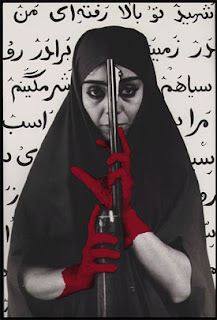
Iranian women directors and actresses speak about their films, including Rakhshan Bani Etemad (Nargess, Under the City’s Skin), Tahmineh Milani (The Hidden Half, Cease Fire), Samira Makhmalbaf (The Apple, Blackboards), photographer/video artist/experimental filmmaker Shirin Neshat (Zarin, Rapture), and actresses Niki Karimi and Fatemeh Motamed Aria. (Iran, 58 mins.) Screens with the documentary SHIRIN NESHAT (Iran, 30 mins.)
Sunday, August 10 @ 4:30 p.m.
DISTANT by Nuri Bilge Ceylan. 
A deeply compassionate and frequently amusing study of quiet desperation, Muzaffer Özdemir and Mehmet Emin Toprak shared Best Actor honors at the 2003 Cannes Film Festival for their perfectly nuanced performances as (respectively) divorced, 40-something photographer Mahmut and his distant relative Yusef, who arrives in Istanbul looking for work, and quickly wears out his welcome. With understated humor, Ceylan observes Mahmut and Yusef's chronic isolation. (Turkey. 105 mins.)
Sunday, August 10 @ 6:30 p.m.
A JIHAD FOR LOVE by Parvez Sharma. 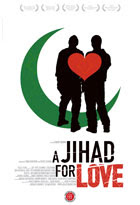
Fourteen centuries after the revelation of the holy Qur'an to the Prophet Muhammad, Islam today is the world's second largest and fastest growing religion. Muslim gay filmmaker Parvez Sharma travels the many worlds of this dynamic faith, discovering the stories of its most unlikely storytellers: lesbian and gay Muslims. Produced by Sandi DuBowski (Trembling Before G-d), A Jihad for Love was filmed in 12 countries and 9 languages and comes from the heart of Islam. (Middle East, 81 mins.)
OFFICIAL CLOSING NIGHT GALA:
Sunday, August 10 @ 8:00 p.m.
CAPTAIN ABU RAED by Amin Matalqa. 
Captain Abu Raed is a universal story of friendship, inspiration and heroism set in contemporary Jordan. Abu Raed is a lonely janitor at Amman’s International Airport. Never having realized his dreams of seeing the world, he experiences it vicariously through books and brief encounters with travelers. Finding a discarded Captain’s hat in the trash at work one day, he is followed by a neighborhood boy who spots him wearing it as he walks home. The next morning he wakes up to find a group of neighborhood children at his door, believing him to be an airline pilot. And thus the friendship begins. Happy for the company and attention, he takes the children to colorful places around the world through his fictional stories and inspires them to believe in their own ambitions. Murad, an angry outsider to the group, vindictively attacks Abu Raed and the sense of hope he instills in the children. In his quest to prove that Abu Raed is a liar and a fake, Murad begins to discover new possibilities in his life. Meanwhile, Abu Raed’s friendship with Nour, a real female pilot, begins to grow as she deals with her own set of pressures from life in modern Amman. Captain Abu Raed is the story of everyday people intersecting across social boundaries. It is a story of dreams, friendship, forgiveness, and sacrifice. Winner of the AUDIENCE AWARD at the 2008 Sundance Film Festival. Best Director, Seattle International Film Festival, and Best Actor and Best Actress Newport Beach Film Festival. http://www.captainaburaed.com/home/ (Jordan, 102 mins.)
___________________________________________________________________________________________
2008 FILMS BY COUNTRY:
From EQYPT:
Sunday, August 3 @ 7:00 p.m.
DUNIA (KISS ME NOT ON THE EYES) by Jocelyn Saab. Dunia (Hanane Turk) is an Egyptian woman in her early twenties whose mother was a famous belly dancer. Dunia has inherited her mother's beauty and talent, but is also keenly intelligent and is studying toward a master's degree in literature. Dunia studies dance under an instructor (Walid Aouni) who obviously is drawn to her as well as her skills, and she's also caught the eye of Beshir (Mohamed Mounir), an instructor at her college who is also helping her with her thesis on romantic poetry of the Arab world. However, Dunia is swept off her feet by Mamdouh (Fathi Abelwahab), a handsome young man who values her intelligence and independence. However, when Dunia marries Mamdouh, his attitude changes as he makes it his business to stifle her forthright nature, while Dunia's mother fears he may force Dunia to undergo the clitoral circumcision that was common to women of her generation. Wanting to express herself, Dunia signs up to take part in an international dance competition, but rather than traditional Egyptian belly dancing, she presents a bold performance piece inspired by the repression of women in her homeland. (Eqypt, 110 mins.)
Friday, August 8 @ 5:30 p.m.
THESE GIRLS by Tahani Rached. This fresh, irresistibly lively and intensely engaging documentary follows a band of teenage girls living on the streets of Cairo. Rached won astonishing access to the girls’ world; this vigorous, cinematic film is built upon the deep trust of its subjects and the long experience of the filmmaker. Already at a disadvantage as impoverished and abused girls in a Muslim society, they encounter rape, drug addiction, prostitution, pregnancy and motherhood on the streets. While the girls’ troubles are not downplayed, neither are their courage, playfulness and vibrant camaraderie. Rached brings alive the pulse of Cairo’s streets, offering an unsentimental portrait that avoids traps of guilt or cheap pity. What stands out is the strength and sheer joy that these girls project. With deft skill Rached reveals an invisible world and offers a loving homage to the inspirational, fierce girls who inhabit it. (Eqypt, 68 mins.)
From IRAN:
Sunday, August 10 @ 3:00 p.m.
IRANIAN WOMEN FILMMAKERS by Hamid Khairoldin & Majid Khabazian. Iranian women directors and actresses speak about their incentives, motives and challenges for making their films. In this film, directors such as Rakhshan Bani Etemad (Nargess, Under the City’s Skin), Tahmineh Milani (The Hidden Half, Cease Fire), Samira Makhmalbaf (The Apple, Blackboards), photographer/video artist/experimental filmmaker Shirin Neshat (Zarin, Rapture), and actresses such as Niki Karimi and Fatemeh Motamed Aria are presented. The film also covers the period when Tahmineh Milani was arrested in September 2001 in Tehran for her controversial film "The Hidden Half". (Iran, 58 mins.) Screens with SHIRIN NESHAT (Iran, 30 mins.)
Saturday, August 2 @ 2:00 p.m. plus Sunday, August 10 @ 3:00 p.m.
SHIRIN NESHAT A profile of the acclaimed photographer, filmmaker, and video artist, Iranian-born Shirin Neshat addresses the complex forces shaping the identity of Muslim women throughout the world and explores the social, political, and psychological dimensions of women’s experiences. In this documentary, she introduces and explicates her haunting video installations Shadow Under the Web; Turbulent; Soliloquy; Rapture; and Fervor, as well as her seminal series of still images, The Women of Allah. In addition, she discusses being both an insider and an outsider in two different cultures, the narrative power of cinema, sexual taboos in Islamic society, the tension between traditional and modern values, the nature of expression when expression itself is forbidden, and the quiet strength and bravery of women that prompts them to rebel against repression. (Iran, 30 mins.)
Saturday, August 2 @ 2:00 p.m.
CINEMA ON FIRE by Mark Cousins. These two documentaries, which were produced for the South Bank Show, look at the Iranian cinema revolution and the international success of Iranian cinema. Cinema on Fire features film clips and interviews with film critics and renowned filmmakers Abbas Kiarostami (A Taste of Cherry, Close-up), Jafar Panahi (The White Balloon, The Circle), Dariush Mehrjui (The Cow, Hamoun, Leila) and Bahraim Beizai (Bashu, The Little Stranger) and film festival programmers throughout Europe. (Iran, 45 mins.) Screens with SHIRIN NESHAT (Iran, 30 mins.)
Monday, August 4 @ 5:30 p.m.
PROSTITUTION BEHIND THE VEIL by Nahid Persson. The film is a sympathetic portrait of the two women, exploring their day-to-day life and the workings of prostitution in a country that bans it and prosecutes adulterers, sometimes with the penalty of capital punishment. Many of the clients find a way to buy sex and still comply with Muslim law: they marry the women in what is called "Sighe," a temporary marriage sanctioned in Shia Islam. Sighe can last from two hours up to 99 years. Both Minna and Fariba enter into Sighe with clients, and Fariba is in a Sighe marriage with a neighbour, Habib, that lasts six months. Giving his perspective on temporary marriage, Habib says that Sighe is a way to help poor women, it is an act of mercy in the name of Allah. (Iran, 58 mins.)
Sunday, August 10 @ 2:00 p.m.
JEWS OF IRAN by Ramin Farahani. This film takes you on a rare journey through Iran's Jewish communities from Tehran to Isfahan, and finally to Shiraz, where an infamous case against jews accused of spying for Israel took place. Director Ramin Farahani illuminates the vast discrimination of Jews in Iran, while simultaneously revealing the rich and passionate culture of a community, their strong relationship to their country, and their hopes for the future. The Jewish settlement in Iran dates back to 2700 years. The Islamic Revolution of 1979 resulted in the departure of many Jews from the country. This film concentrates on Jews living in Iran presently, with an eye on recent historic developments. In Tehran, young and old Jews speak about different kinds of discrimination. However, there are also positive aspects, such as a close friendship between two tolerant Muslim and Jewish families. There is a strong and responsive bond between the Jewish community. A lonely elderly woman from the old Jewish neighborhood of Tehran is treated for free at the Jewish hospital. In Isfahan, we witness the love and passion that the main characters have developed for the place they live in. Soleiman Sassoon is a Jewish artist who finds inspiration in Iranian art and Islamic architecture. In Shiraz, the film focuses more on an espionage case against the Jews. Parallel to this, we follow a young Jewish boy who is interested in computers and music. The film ends with a prayer before the Jewish New Year at a synagogue in Tehran. (Iran, 52 mins.)
Sunday, August 3 @ 9:00 p.m.
ATASHBAS (CEASE FIRE) by Tahmineh Milani. In this romantic comedy, an attractive young married couple with money to burn snipe at each other, destroy the house, run each other off the road and nearly divorce before they solve their problems in a psychiatrist's office. It sounds like an Iranian "Mr. and Mrs. Smith," or “War Of The Roses”, only instead of being hired assassins, the warring protagonists in "Cease Fire" are an architect and an engineer. Persian audiences have devoured this irreverent romantic comedy, spiced with saucy dialogue that spoofs traditional gender roles through gritted teeth, making it the biggest box office champ in the history of Iranian cinema. Tahmineh Milani, known for feminist melodramas like Two Women and The Hidden Half, puts a pointed message below the fun. As much sociologist as filmmaker, Milani's professed intent is to educate her countrymen about modern marriage, and to change male attitudes about wives with careers. (Iran, 90 mins.)
Tuesday, August 5 @ 9:00 p.m.
CAFE SETAREH by Saman Moghadam. The itch for change felt by three women living in a poor Tehran neighborhood is palpably expressed in this multi-award winning finely nuanced film. The rare film equally influenced by Quentin Tarantino, Jean Renoir and William Saroyan, this time-winding triptych has a deep humanist sense and a feel for working-class folk whiling away the hours. The film also reminds that, in a country theoretically oppressive of women's full expression, Iranian cinema is second to none as a delivery vehicle for rich dramas about women. Three women in an old district of Tehran face challenges. Fariba supports herself and family by managing a small cafe in the district with no support from her jobless, debauched husband. Young and beautiful Saloomeh dreams of marrying Ebi. She wants for more comfortable life, but Ebi, a mechanic, cannot even pay for a wedding or apartment. Moluk, a middle-aged woman, has fallen for a younger man, but... (Iran, 102 mins.)
Wednesday, August 6 @ 7:00 p.m.
BLACK TAPE: A TEHRAN DIARY, THE VIDEOTAPE FARIBORZ KAMBARI FOUND IN THE GARBAGE by Fariborz Kamkari. Banned in Iran this experimental film uses fictionalized, grainy, home video footage to tell the story of the abusive relationship between a successful middle aged Iranian businessman and his 18 year old wife, Goli. She has just received a camcorder as his birthday present and the entire story is told from the view of this camcorder. Goli has lived with him and been his sex slave since he took her captive as a nine year old from her family in the Kurdish rebellion. She is now pregnant. As she starts to talk back to him, he discovers that she has learned English and started to read. He must now make her a prisoner in his home. (Iran. 83 mins.)
From IRAQ:
Wednesday, August 6 @ 9:00 p.m.
BAGHDAD SHORTS COLLECTION - VOL. 1
These five short films were made by students at the Independent Film & Television College of Baghdad between the end of 2004 and May of 2007. Each piece offers viewers a window into the life of ordinary Iraqis during this extraordinary and turbulent time. Documentary Course - March, 2006 . Director Kamal documents the lives of his fellow college students as they enroll in classes and face the challenges of filming in the war-torn streets of Iraq. Hiwar . Opened in 1992, the Hiwar Center is a gathering place for artists, musicians and filmmakers. This wonderful short work showcases the center and explores its role as a vibrant meeting-place in the heart of Baghdad. Dr. Nabil . A committed surgeon and father, Dr. Nabil works at a small, understaffed Baghdad hospital suffering from a lack of equipment and medicine. Though other doctors have been killed or have fled the country, Dr. Nabil has decided to stay. Baghdad Days. This video diary chronicles Hiba Bassem's first year in Baghdad as she searches for a place to live, looks for work, attends college, deals with family problems and struggles to come to terms with her position as a woman living on her own. Thinking About Leaving . Living in a house with her sisters, mother and brother without electricity and surrounded by constant danger, director Hiba Bassem ruminates about what the past three years have brought to those who are living in Iraq. (Iraq, 87 mins.)
Thursday, August 7 @ 7:00 p.m.
BAGHDAD SHORTS COLLECTION - VOL. 2
These six short films were made by students at the Independent Film & Television College of Baghdad between the end of 2004 and May of 2007. Each piece offers viewers a window into the life of ordinary Iraqis during this extraordinary and turbulent time. Staying. The Dora District of Baghdad was once a lively area full of palm groves and people of all kinds, but that all changed with the US invasion of Iraq. Leaving . Bahram Al Zuhairi's powerful film documents an Iraqi family's painful journey as they sell their personal effects and make the dangerous trip to their new home in Syria. Omar Is My Friend. A student at Baghdad University, Omar also works as a taxi driver to make ends meet for his family. Here he discusses various hardships facing Iraqis today. Let the Show Begin . Preparation and staging of the Baghdad International Short Film Festival is the subject here. This cultural event moved foward in spite of formidable obstacles. A Stranger In His Own Country. A refugee from Kirkuk living in a camp outside Kerbala, Abu Ali struggles to survive and provide for his family under the difficult circumstances they now face there. The Shabandar Cafe. A cultural landmark in the old center of Baghdad, the cafe had been a gathering place for Iraqi intellectuals for years. Sadly, it was destroyed by a car bomb in 2007. (Iraq, 106 mins.)
Saturday, August 9 @ 7:00 p.m.
THE CORPORAL’S DIARY by Patricia Boiko & Laurel Spellman Smith. Jonathan Santos, 22, documented his 37 days in Iraq on video and in writing; never knowing that day 38 would be his last. From high explosives to clandestine home brew, his video footage and witty narrative combine personal musings on life, death, and the future he imagined but would never see. Through Jonathan’s handwritten words and videotape, the film tells a personal and profound story. Thanks to Jonathan's candid diary and videos, he will now be remembered as more than just dead soldier No. 1,096. The message rings clear: The victims of the Iraq War go beyond casualties on the field. (Iraq, 60 mins.) Screens with ALLAHU AKBAR plus AMER & NASSER (Iraq, 5 mins. each)
Saturday, August 9 @ 7:00 p.m.
ALLAHU AKBAR by Kristie Alshaibi. A joyful and playful animation made out of the traditional geometric themes of Islamic art. These complex geometries are rendered in simple black and white, and then superimposed and spun around their central axis, in a close rhythmic relationship with the lively soundtrack of traditional and popular Iraqi music. The result is a giddy playfulness, reminiscent of psychedelic Pop Art, and far removed from the contemplative quiet one normally associates with Mosques and the inner courtyards of traditional Arab architecture. (Iraq, 5 mins.)
Saturday, August 9 @ 7:00 p.m.
AMER & NASSER directed by Al Fadhil. How can one talk about death without showing the dead? Or, experience suffering without seeing the wounds? A possible answer is found in “Amer & Nasser”, a videogram excerpted from a documentary on the 1991 rebellion of Iraqi people, which turned into a bloodbath. The two blindfolded faces apparently emanate serenity and resignation, but they also hide a terrible anguish. (Iraq, 5 mins.)
From ISRAEL:
Friday, August 1 @ 7:00 p.m. plus Saturday, August, 9 @ 8:30 p.m.
BEAUFORT by Joseph Cedar. Winner Silver Bear Award at the Berlin Film Festival, and Best Editing, Best Art Direction, Best Cinematography and Best Sound at the Awards of the Israeli Film Academy as well as a Best Foreign Language Academy Award 2007 nominee. Lebanon in the year 2000. Not far from the old seafarer's fortress, Beaufort, is a military base with the same name kept by the Israeli army. This heavily guarded post has been here since the war in Lebanon in 1982. It is a symbol not only of Israel's most controversial campaign for military control of Lebanon, but also of a sacrificial struggle during which many soldiers lost their lives. The Israeli troops move out of Lebanon, leaving behind their base at Beaufort. On the evening of May 24th, the base is destroyed, blown up by thousands of mines. The powerful explosion marks the end of 18 years of Israeli occupation. The film tells the story of Liraz Liberti, the 22-year-old commander of Beaufort, and his troops during the last few months prior to their withdrawal. The story does not center on the war but on their retreat. The base is still under enemy fire as Liraz prepares to explode the site, thus destroying everything that his friends and comrades have died for trying to defend. (Israel/Lebanon, 125 mins.)
Saturday, August 2 @ 9:30 p.m.
JAPAN, JAPAN by Lior Shamriz. Imri, a handsome, gay, nineteen-year-old, ex-soldier moves to Tel Aviv but dreams ultimately of moving to Japan. For the time being, however, he settles into an apartment, complete with an oddball roommate, and toils away at a random job. In his off hours, he cruises for boys, investigates the scene, and religiously surfs porn, which invades the film, creating an exotic, sexually graphic cyberspace landscape in parallel existence with Lior’s more mundane everyday existence. Japan Japan admirably crams more male nudity and cinema theory into its first sixty seconds than any film you’ve ever seen (unless you are a really major porn aficionado). Semi-improvised but immediately and viscerally accessible, Japan, Japan signals Lior Shamriz and lead actor Imri Kahn as ones to watch. (Israel, 65 mins.)
Thursday, August 7 @ 9:00 p.m.
TO SEE IF I’M SMILING by Tamar Yarom. Israel is the only country in the world where 18-year-old girls are drafted for compulsory military service. In this award-winning documentary, the frank testimonials of six female Israeli soldiers stationed in Gaza and the West Bank pack a powerful emotional punch. The young women revisit their tours of duty in the occupied territories with surprising honesty and strip bare stereotypes of gender differences in the military. The former soldiers share shocking moments of negligence, flippancy, immaturity and power-tripping as they describe atrocities they witnessed and participated in. The psychological transformation that these young women underwent as a result of military service is both unsettling and riveting. The culture of war transforms people: personalities change, moral codes are subverted, values are supplanted and masks are constructed to dull the pain of what they did and didn't do in uniform. At a time when women in the military are increasingly on the frontlines, and the actions of soldiers all over the world are being questioned, this powerful film explores the ways that gender, ethics and moral responsibility intersect during war. (Israel/Palestine, 59 mins.)
Thursday, August 7 @ 5:30 p.m.
HOME GAME by Yaron Shane. "Home Game" documents the story of graduating 12th graders, from the Israeli settlement of Netzer Hazani, during their last vacation before adulthood. Their yearly summers usually focused on the annual youth final four basketball competition. Yet their 2005 summer vacation turned into something else entirely because the Israeli government began to implement its plan to remove them from their homes in Gush Katif, Gaza, as part of the Middle East peace process. Instead of just competing on the basketball court they were also forced to compete on their 'home' court as well. This is a documentary about the teenage years, growing up and the youth who were forced to deal with a confusing reality that potentially harmed their whole system of beliefs and values. On the day all Israeli civilians were ordered to leave Gush Katif, high school students from Netzer Hazani held their final basketball game, which would decide the tournament. "Apparently someone above intended it to be that way," a Gush Katif resident in the movie said. "There are still many people who won't allow themselves to feel sympathy for the families of Gush Katif," Avi Abelow, the film's producer added that the film's aim was to "put aside political views, and to start to understand who these people are." (Israel, 83 mins.)
Saturday, August 2 @ 5:00 p.m.
ENRAGED by Eyal Eithcowich. "Enraged" follows a group of Jewish-Israeli activists who refuse to sit back while the occupation continues. They bring food into Palestinian villages under curfew, tear down parts of the separation barrier, and serve as human shields for Palestinian demonstrators. In Israel they are ostracized; in Palestine they endure a similar fate to that of the Palestinians—they are beaten, sprayed with tear-gas, and shot at with rubber-coated bullets. One such bullet hits one of the film's main characters, a 16 year old boy from Tel Aviv, in the head, permanently impairing his eyesight. The heroes of "Enraged" jolt viewers out of their passivity, forcing them to ask: what can I do to end the occupation? (Israel/Palestine, 58 mins.)
Sunday. August 3 @ 5:00 p.m.
TO DIE IN JERUSALEM by Hilla Medalia. Ever since 17-year-old Rachel Levy, an Israeli, was killed four years ago in Jerusalem by a Palestinian suicide bomber, her mother Abigail has found hardly a moment's peace. Levy's killer was Ayat al-Akhras, also 17, a schoolgirl from a Palestinian refugee camp several miles away. The two young women looked unbelievably alike. TO DIE IN JERUSALEM unabashedly explores the Palestinian-Israeli conflict through the personal loss of two families. The film's most revealing moment is in an emotionally charged meeting between the mothers of the girls, presenting the most current reflection of the conflict as seen thru their eyes. (Israel/Palestine, 76 mins.)
From JORDAN:
Saturday, August 2 @ 6:15 p.m.
QUELQUES MIETTES POUR LES OISEAUX (A FEW CRUMBS FOR BIRDS) directed by Nassim Amaouche. This is a documentary portrait of Ruwayshed, the last village in Jordan before the border with Iraq, situated in a desert of black rock. Inspired by a song by an Iraqi-Palestinian band the filmmakers produce a montage of images and conversations with people working in Ruwayshed, including diesel vendors and teenage girls serving in a hotel bar. The film has won awards at festivals in Montpellier and Clermont-Ferrand. (Jordan, 28 mins.) Screens with WET TILES, TRANSIT, and BE QUIET (63 mins. TRT)
Sunday, August 10 @ 8:00 p.m.
CAPTAIN ABU RAED by Amin Matalqa.
Captain Abu Raed is a universal story of friendship, inspiration and heroism set in contemporary Jordan. Abu Raed is a lonely janitor at Amman’s International Airport. Never having realized his dreams of seeing the world, he experiences it vicariously through books and brief encounters with travelers. Finding a discarded Captain’s hat in the trash at work one day, he is followed by a neighborhood boy who spots him wearing it as he walks home. The next morning he wakes up to find a group of neighborhood children at his door, believing him to be an airline pilot. And thus the friendship begins. Happy for the company and attention, he takes the children to colorful places around the world through his fictional stories and inspires them to believe in their own ambitions. Murad, an angry outsider to the group, vindictively attacks Abu Raed and the sense of hope he instills in the children. In his quest to prove that Abu Raed is a liar and a fake, Murad begins to discover new possibilities in his life. Meanwhile, Abu Raed’s friendship with Nour, a real female pilot, begins to grow as she deals with her own set of pressures from life in modern Amman. Captain Abu Raed is the story of everyday people intersecting across social boundaries. It is a story of dreams, friendship, forgiveness, and sacrifice. Winner of the AUDIENCE AWARD at the 2008 Sundance Film Festival. Best Director, Seattle International Film Festival, and Best Actor and Best Actress Newport Beach Film Festival. http://www.captainaburaed.com/home/ (Jordan, 102 mins.)
From LEBANON:
Friday, August 8 @ 7:00 p.m.
I SWAM IN THE SEA LAST WEEK directed by Nesrine Khodr. A symbolic and poetic video evoking a changing political situation through the metaphor of a female body swimming in the sea... (Lebanon, 3 mins.) Screens as part of a Lebanese Shorts Program (77 mins. TRT)
Friday, August 1 @ 9:30 p.m.
ZONE FRONTALIERE (BORDER ZONE) by Christophe Karabache. Lebanon, in the aftermath of the war of July-August 2006. A journey between Beirut and the South shows bodies going through suffocation, political crisis and uncertain chaos. Border Lines of a war…suspended. A waking up in the ruins. Sleepwalker in blood. Check point / territory / Shelter / bombs. Beirut…fragments of frontage. Division, scission, skeletons of cement, corpses cut down. A Human cry from the debris. A beautiful and poet experimental film. French experimental filmmaker Christophe Karabache should be here to present his film (pending his ability to get a visa from the U.S. government). Sponsored by the New Orleans Consulate de France. (Lebanon, 45 mins.)
Saturday, August 9 @ 3:30 p.m.
MARATHON BEIRUT, For the Love of Lebanon by Deborah Harse. a documentary that was shot mostly in November-December 2006. A marathon in the aftermath of the war with Israel was that much more ardent a metaphor for perseverance. Despite all the political upheavel, the Beirut Marathon Association chose to carry on with the event as a testament to the resilience of the Lebanese people. But just 5 days before the race, a government minister, Pierre Gemayel, was assassinated. After much deliberation, they decided not to cancel, but to postpone the race by one week. Then, 2 days before the new marathon date, Hezbollah called for a rally in the central square. But nevertheless, the marathon took place with 24,000 people turning out in solidarity to run or walk the 5 kM, 10 kM and 42 kM races with For the Love of Lebanon as the theme. And of course, a Kenyan won. Filmmaker Deborah Harse is tentatively scheduled to attend. (Lebanon, 80 mins.)
Saturday, August 2 @ 3:30 p.m.
BEIRUT DIARIES by Mai Masri. Noted Palestinian filmmaker Mai Masri presents an eye-opening documentary centered on the experiences of a young woman living in Beirut who along with hundreds of thousands of other women stage a sit-in after the assassination of former Prime Minister Rafiq Hariri. From acclaimed director Mai Masri (Frontiers of Dreams and Fears), the film explores the critical transformations and crucial questions facing Lebanon at this turning point in it's history. (Lebanon, 80 mins.)
Saturday, August 9 @ 2:00 p.m.
33 DAYS by Mai Masri. Filmed during the massive Israeli attack on Lebanon in 2006, 33 Days chronicles the lives of four young people working in theatre, media and emergency relief. Through their creativity and commitment, the film tells untold stories that forever marked the lives of those who survived that fateful summer in Beirut. (Lebanon, 70 mins.)
Friday, August 8 @ 7:00 p.m.
FROM BEIRUT WITH LOVE by Wael Noureddine. One of the quiet eccentricities of Lebanese pop culture is the picture postcard. Beirut gift shops and bookshops stock them like any other tourist destination. The odd thing here is that many of the locations no longer exist. Shots of the former Martyrs' Square (when it actually was a square). (Lebanon, 30 mins.) Screens as part of a Lebanese Shorts Program (77 mins. TRT)
Friday, August 8 @ 7:00 p.m.
(AS IF) BEAUTY NEVER ENDS... by Jayce Salloum. This short film commemorates the 1982 Sabra and Shatilla massacre. It is a reflection of the past, its present context and forbearance. As Abdel Majid Fadl Ali Hassan recounts a story told by the rubble of his home in Palestine, the tape permeates into an intense essay on dystopia in contemporary times. An elegiac response, working directly, viscerally, and metaphorically. (Lebanon/Palestine, 12 mins.) Screens as part of a Lebanese Shorts Program (77 mins. TRT)
Friday, August 8 @ 7:00 p.m.
SAVING FACE directed by Jalal Toufic. Were all the candidates' faces posted on the walls of Lebanon during the parliamentary campaign of 2000 waiting for the results of the elections? No. As faces, they were waiting to be saved. Far better than any surgical face-lift or digital retouching, it was the physical removal of part of the poster of the face of one candidate so that the face of another candidate would partially appear under it; as well as the accretions of posters and photographs over each other that produced the most effective face-lift, and that proved a successful face-saver for all concerned. We have in these resultant recombinant posters one of the sites where Lebanese culture in specific, and Arabic culture in general, mired in an organic view of the body, in an organic body, exposes itself to inorganic bodies. (Lebanon, 8 mins.) Screens as part of a Lebanese Shorts Program (77 mins. TRT)
Friday, August 8 @ 7:00 p.m.
AFTER SHAVE (BEYROUTH APRES-RASAGE) by Hamy Tamba. Abou Milad is an old barber who lost his salon during the Lebanese civil war. One day he is summoned by a recluse who lives in a grand bourgeois house and his life will be changed forever. Winner of the Cesar for Best Short Film. (Lebanon, 27 mins.) Screens as part of a Lebanese Shorts Program (77 mins. TRT)
From PALESTINE:
Monday, August 4 @ 9:30 p.m.
RAFAH, CHRONICLE OF A CITY IN THE GAZA STRIP by Stéphane Marchetti & Alexis Monchovet. A close quarters portrait of the Palestinian city in the course of a year of upheavals (12 September 2005 - 12 September 2006). Rafah is located in the southern Gaza Strip. It’s a city cut in two by the Philadelphia Road, a security corridor between Sinai and Gaza. It’s destiny changed during the night of 12 September 2005, when the Israeli army withdrew from the Gaza Strip. The Israelis evacuated the Philadelphia Road and the colonies surrounding the city disappeared. A new era could begin. But Rafah would never emerge from its chaos. Rafah is the hub of arms trafficking between Egypt and the Gaza Strip. Since the Israeli withdrawal, these arms have contributed to the bloody wars between families. After the Hamas victory at the legislative elections, the city sank into a major economic crisis. On 25 June, 2006, Israeli corporal Gilad Shalit was abducted by Palestinian militants using a tunnel dug from Rafah. In reprisal, Tsahal shelled the houses of arms dealers located along the Philadelphia Road. By 12 September, 2006, a year after the withdrawal, all hopes of rebirth had died. (Palestine, 52 mins.) Screens with LIGNE VERTE (Palestine, 4 mins)
Saturday, August 9 @ 6:30 p.m.
BE QUIET by Sameh Zoabi. A simple car trip beset by politically charged tension and a militarized reality brings politically charged tensions and a militarized reality to a father and his young son. (Palestine, 19 mins.) Screens with WET TILES, TRANSIT, and A FEW CRUMBS FOR THE BIRDS 63 mins. TRT)
Monday, August 4 @ 9:30 p.m.
LIGNE VERTE by Laurent Mareschal. In this acclaimed French animation, at first sight you see a wall-painting and hear sounds of building engines far away but still present. This fresco represents a kind of Mediterranean landscape. Then you slowly discover the painting and its principal characters: the cactus, the Cyprus tree and the olive tree. At the end, the camera stays still. You didn’t really pay attention, but some small stones fell on the ground at a moment; now you’ll discover that a branch of the olive tree was guilty. It grew up inside the wall. And now it’s the whole painting that turn to life. The rebels destroy the 'security fence' and a whole of it fell apart on the ground. You should be optimistic if the last travelling wouldn’t ruin this hope…(Palestine, 4 mins.) Screens with RAFAH CHRONICLE (Palestine, 58 mins)
Thursday, August 7 @ 9:00 p.m.
TO SEE IF I’M SMILING by Tamar Yarom. Israel is the only country in the world where 18-year-old girls are drafted for compulsory military service. In this award-winning documentary, the frank testimonials of six female Israeli soldiers stationed in Gaza and the West Bank pack a powerful emotional punch. The young women revisit their tours of duty in the occupied territories with surprising honesty and strip bare stereotypes of gender differences in the military. The former soldiers share shocking moments of negligence, flippancy, immaturity and power-tripping as they describe atrocities they witnessed and participated in. The psychological transformation that these young women underwent as a result of military service is both unsettling and riveting. The culture of war transforms people: personalities change, moral codes are subverted, values are supplanted and masks are constructed to dull the pain of what they did and didn't do in uniform. At a time when women in the military are increasingly on the frontlines, and the actions of soldiers all over the world are being questioned, this powerful film explores the ways that gender, ethics and moral responsibility intersect during war. (Israel/Palestine, 59 mins.)
Saturday, August 9 @ 5:30 p.m.
3 TIMES DIVORCED by Ibtisam Salh Mara'ana. How does a Palestinian woman in Israel survive an abusive husband? When Gaza-born Khitam’s abusive Arab Israeli husband divorces her and gains custody of her six children, she suddenly finds herself fighting two heart-breaking battles: against the Sharia Muslim court to get her children back, and against the state of Israel, which considers her an illegal resident and denies her protection in a shelter for battered women. 3 TIMES DIVORCED is a fascinating and disturbing look at a civil and religious legal system that denies women the right to get a divorce independent of their husbands. It highlights the bind that abused women find themselves in when their immigration status is contingent upon marriage. With remarkable access and an unflinching lens that never sensationalizes, award-winning filmmaker Ibtisam Salh Mara'ana captures Khitam’s astonishing courage as she faces an impossible situation with no country or court to protect her. (Palestine/Israel, 74 mins.)
Saturday, August 9 @ 6:30 p.m.
TRANSIT by Taysir Batniji. In 2004 Taysir Batniji photographed his journey to the Gaza Strip. The work Transit presents these images and reflects on the extremely difficult conditions under which Palestinians must travel. (Palestine, 8 mins.) Screens with WET TILES, BE QUIET, and A FEW CRUMBS FOR THE BIRDS 63 mins. TRT)
Saturday, August 2 @ 5:00 p.m.
ENRAGED by Eyal Eithcowich. "Enraged" follows a group of Jewish-Israeli activists who refuse to sit back while the occupation continues. They bring food into Palestinian villages under curfew, tear down parts of the separation barrier, and serve as human shields for Palestinian demonstrators. In Israel they are ostracized; in Palestine they endure a similar fate to that of the Palestinians—they are beaten, sprayed with tear-gas, and shot at with rubber-coated bullets. One such bullet hits one of the film's main characters, a 16 year old boy from Tel Aviv, in the head, permanently impairing his eyesight. The heroes of "Enraged" jolt viewers out of their passivity, forcing them to ask: what can I do to end the occupation? (Israel/Palestine, 58 mins.)
Tuesday, August 5 @ 5:30 p.m.
ENCOUNTER POINT by Ronit Avni & Julia Bacha. Just when the world is losing hope about the possibility of resolving the Palestinian-Israeli conflict comes Encounter Point. Created by a Palestinian, Israeli, North and South American team, Encounter Point moves beyond sensational and dogmatic imagery to tell the story of an Israeli settler, a Palestinian ex-prisoner, a bereaved Israeli mother and a wounded Palestinian bereaved brother who risk their safety and public standing to press for an end to the conflict. They are at the vanguard of a movement to push Palestinian and Israeli societies to a tipping point, forging a new consensus for nonviolence and peace. Perhaps years from now, their actions will be recognized as a catalyst for constructive change in the region. Encounter Point is a film about hope, true courage and implicitly about the silence of journalists and politicians who pay little attention to vital grassroots peace efforts. (Palestine, 85 mins.)
Sunday, August 3 @ 5:30 p.m.
TO DIE IN JERUSALEM by Hilla Medalia. Ever since 17-year-old Rachel Levy, an Israeli, was killed four years ago in Jerusalem by a Palestinian suicide bomber, her mother Abigail has found hardly a moment's peace. Levy's killer was Ayat al-Akhras, also 17, a schoolgirl from a Palestinian refugee camp several miles away. The two young women looked unbelievably alike. TO DIE IN JERUSALEM unabashedly explores the Palestinian-Israeli conflict through the personal loss of two families. The film's most revealing moment is in an emotionally charged meeting between the mothers of the girls, presenting the most current reflection of the conflict as seen thru their eyes. (Israel/Palestine, 76 mins.)
Friday, August 8 @ 7:00 p.m.
(AS IF) BEAUTY NEVER ENDS... by Jayce Salloum. This short film commemorates the 1982 Sabra and Shatilla massacre. It is a reflection of the past, its present context and forbearance. As Abdel Majid Fadl Ali Hassan recounts a story told by the rubble of his home in Palestine, the tape permeates into an intense essay on dystopia in contemporary times. An elegiac response, working directly, viscerally, and metaphorically. (Lebanon/Palestine, 12 mins.) Screens as part of a Lebanese Shorts Program (77 mins. TRT)
From SYRIA:
Friday, August 8 @ 7:00 p.m.
BEFORE VANISHING directed by Joude Gorani. The Barada river surrounds the capital city of Damascus. Often deemed iconic of nature's wondrous beauty, we discover how the Barada river has suffered from exploitation, neglect, pollution and unplanned urbanization. The film also uncovers the transformation of the river's social life and provides an intelligent measure of the distance between ideology and reality, in contemporary Syria. (Syria, 13 mins.)
Friday, August 8 @ 7:00 p.m.
WE WILL LIVE TO SEE THESE THINGS by Julia Meltzer & David Thorne. A documentary video in five parts presenting competing visions of an uncertain future, WE WILL LIVE TO SEE THESE THINGS was shot in 2005 and 2006 in Damascus, Syria. Each section of the piece—the chronicle of a building in downtown Damascus; documentation of an equestrian event; an interview with a dissident intellectual; a portrait of children learning the Qur’an; the recitation of a vision beheld by a U.S. policymaker—offers a different perspective on what might come to pass in a place where people live between the forces of a repressive regime, a growing conservative Islamic presence and shifting pressures from the USA. (47 mins.)
Friday, August 8 @ 7:00 p.m.
NOT A MATTER OF IF BUT WHEN by Julia Meltzer & David Thorne. Developed with the filmmakers while living in Demascus, young Syrian performer Rami Farah uses various modes of address such as a promise, a threat, a curse, a joke and a premonition in order to speak to the current state of affairs in Syria and the Middle East. Through a combination of direct address and fantastical narrative, Rami's improvisations speak to living in a condition of uncertainty, chaos and stasis. (Syria, 17 mins.)
From TURKEY:
Saturday, August 2 @ 7:30 p.m.
TIME AND WINDS by Reha Erdem. A small, poor village leaning over high rocky mountains, facing the immense sea, flanked by olive yards. Villagers are simple and diligent people who struggle to cope with a harsh nature. They earn their living, on a daily survival basis, out of the earth and of the few animals they feed. They live according to the rhythm of the earth, air and water, day and night and seasons. The daily time is divided into five parts by the sound of the call to prayer. Every day, all human events are lived through within these five time slices. In child raising, grownups go on with the practice they have experienced by their parents. They expose their love awkwardly and consider beating a favorable method. Fathers always prefer one of their sons. Mothers command their daughters ruthlessly. Ömer, Yakup and Yildiz, three children of about 12,13 years old, just between childhood and youth, are the prominent characters in this movie of five times. Ömer, the son of the imam, wishes hopelessly for the death of his father. When he understands that wishful thinking does not have any concrete results, he begins to search for childish ways to kill his father. He shares his guilty thoughts with his friend Yakup. Children study in the village school consisting of only one classroom. Families show their gratitude to the young woman teacher by giving her presents -the bread they cook themselves, the milk of their own sheep. Yakup is in love with his teacher. He hides his guilty feelings even from his best friend Ömer. When some day he sees his father spying the teacher, he dreams, like Yakup, of killing his father. Yildiz both studies and tries to manage the household works imposed by her own mother. She tries to be a mother for her baby brother. On the other hand, she learns with irritation about the secrets of the relationship between men and women. Five times elapse. Children, oscillating between rage and guilt, grow up slowly. (Turkey, 111 mins.)
Sunday, August 3 @ 2:00 p.m.
SARI GELIN: THE TRUE STORY by Ismail Umaç. One of the major conflicts/debates in the middle east is the question of the Turkish/Armenian Genocide. To people on both sides of the debate it is one that provokes great passion, extreme pain and ultimately affects their national identity. To some it is a question of semantics, what constitutes a massacre vs. what constitutes a genocide? Presented by the Turkish American Association of Louisiana, this documentary, produced by the Turkish government, has been filmed in over 13 different countries, and is based on over 10,000 written documents from world archives. For the documentary, interviews were made with 160 people in the country and abroad. Interviews were made with 23 academicians from Turkey and 33 academicians from foreign countries, many of them being Armenian, 14 politicians, 13 chaplains, 6 diplomats, 7 journalists, 4 artists, 2 businessmen, 2 educators, 7 non-governmental organization, chairmen and directors. By definition, a film made by a government or organization designed to achieve a political end is “propaganda”, but that never stopped you from watching Michael Moore’s film.... (Turkey, 70 mins.)
Tuesday, August 5 @ 7:00 p.m.
FRATRICIDE by Yilmaz Arslan. Semo, a Kurdish immigrant and pimp living in Germany, offers to pay for his younger brother Azad to come and join him. Reluctantly Azad accepts his brother's offer, and makes the long journey from his poverty-stricken homeland. He moves in to an asylum for refugees where, amidst hopeless squalor he befriends Ibo, an eleven-year-old orphan, also Kurdish. A powerful and tender bond grows between the two boys, but the odds are against them. Ahmet and Zeki are young second-generation Turks. Frustrated, unemployed, alienated from their heritage and with no place in German society, their anger simmers at fever pitch. Meanwhile, they devote themselves to petty crime and their savage pit bulls. When these four doomed exiles meet, their encounter unleashes a nightmarish cycle of violence they believed they had left behind. Boasting astonishing performances from a largely non-professional cast, award-winning director Yilmaz Arslan's third feature is an explosive tale of desperate conflict and bloody revenge, a savage, furious, heartbreaking portrait of raw humanity struggling for safety, for dignity, for survival in the face of violence, exile and the brutal indifference of a society that wants no part of them. (Turkey, 92 mins.)
Sunday, August 3 @ 3:30 p.m.
KASABA (SMALL TOWN) by Nuri Bilge Ceylan. Told from the perspective of two children, and in four seasons, KASABA describes relationships between members of a Turkish family in a small town. The first part is in a primary school where the family's 11-year-old daughter is a pupil. It shows the social environment to which she has to adopt, and its difficulties. She faces with her feeling of shame and some merciless clues of life... The second part is in spring. We see the girl with her brother, who is four years younger, and their journey to the cornfield where their family are waiting for them. As they pass through the countryside, they encounter the mysteries of nature and wildlife... In the third part the brother and sister witness the complexities and darkness of the adult world... The fourth part takes place at home. This is a tranquil sequence moving between reality and dream. (Turkey, 85 mins.)
Monday, August 4 @ 7:00 p.m.
CLOUDS OF MAY by Nuri Bilge Ceylan. This May in the town seems to be warmer and gloomier than the previous years. Still, everyone seems to be happy despite their small worries and lives closed for any surprises. However, this happiness is a little disturbed by the arrival of Muzaffer who has made up his mind to shoot a film in this town where he had passed his childhood. His father, Emin, is bent on saving the small forest he cultivates on his property from confiscation by the authorities. His nephew, nine year-old Ali, must carry an egg in his pocket for 40 days without cracking it, according to terms of an agreement made with his aunt, who has promised in return to convince Ali's father to purchase a much wanted musical watch for his son. And Muzaffer's cousin, Saffet, who is a young town dweller whose affords are all doomed to failure by bad luck (or is it by his own rebelliousness) and who dreams of going to Istanbul. (Turkey, 130 mins.)
Sunday, August 10 @ 4:30 p.m.
DISTANT by Nuri Bilge Ceylan. A deeply compassionate and frequently amusing study of quiet desperation, prompting many critics to favorably compare writer-director Nuri Bilge Ceylan's subtly hypnotic drama to the films of Ozu and Tarkovsky. Muzaffer Özdemir and Mehmet Emin Toprak shared Best Actor honors at the 2003 Cannes Film Festival for their perfectly nuanced performances as (respectively) divorced, 40-something photographer Mahmut and his distant relative Yusef, who arrives in Istanbul looking for work, and quickly wears out his welcome. Tensions mount, revealing solitude as the natural (if not preferred) state of these lonely, melancholy men. (In the context of this film, it's tragically ironic that Toprak was killed in an auto accident, at age 28, six months before his honors at Cannes.) With understated humor, Ceylan observes Mahmut and Yusef's chronic isolation. (Turkey. 105 mins.)
From UNITED ARAB EMIRATES:
Saturday, August 9 @ 6:30 p.m.
WET TILES by Lamya Gargash. The movie is about constructing a form of a relationship between a man & a woman. Is it an arranged marriage or an intimate rendezvous? It has not been labeled as being this or that, but the main idea of a young girl forced into this relationship. The movie explores her thoughts & mental insights. (United Arab Emirates, 8 mins.) Screens with BE QUIET, TRANSIT, and A FEW CRUMBS FOR THE BIRDS 63 mins. TRT)
About the MIDDLE EAST:
Wednesday, August 6 @ 5:30 p.m.
BLOOD AND OIL by Jeremy Earp. The notion that oil motivates America's military engagements in the Middle East is often disregarded as nonsense or mere conspiracy theory. Blood and Oil, a new documentary based on the critically-acclaimed work of Nation magazine defense correspondent Michael T. Klare, challenges this conventional wisdom to correct the historical record. The film unearths declassified documents and highlights forgotten passages in prominent presidential doctrines to show how concerns about oil have been at the core of American foreign policy for more than 60 years — rendering our contemporary energy and military policies virtually indistinguishable. In the end, Blood and Oil calls for a radical re-thinking of US energy policy, warning that unless we change direction, we stand to be drawn into one oil war after another as the global hunt for diminishing world petroleum supplies accelerates. (US/Middle East, 52 mins.)
Sunday, August 10 @ 6:30 p.m.
A JIHAD FOR LOVE by Parvez Sharma. Fourteen centuries after the revelation of the holy Qur'an to the Prophet Muhammad, Islam today is the world's second largest and fastest growing religion. Muslim gay filmmaker Parvez Sharma travels the many worlds of this dynamic faith, discovering the stories of its most unlikely storytellers: lesbian and gay Muslims. Produced by Sandi DuBowski (Trembling Before G-d) and Sharma, A Jihad for Love was filmed in 12 countries and 9 languages and comes from the heart of Islam. Looking beyond a hostile and war-torn present, it reclaims the Islamic concept of a greater Jihad, whose true meaning is akin to 'an inner struggle' or 'to strive in the path of God' - allowing its remarkable subjects to move beyond the narrow concept of Jihad as holy war. (Middle East, 81 mins.)
festival posters and flyers should be ready for volunteers to distribute this Monday after 6:00 p.m.
festival printed schedules should be out by Friday, July 25
get your festival passes today!
____________________________
Also to coincide with the Festival
Zeitgeist proudly presents
Friday, August 1 @ 10:30 p.m.
OPENING NIGHT CONCERT: THE TARIK HASSAN TRIO
Tarik Hassan is a Palestinian/American bassist, composer, and bandleader based out of New Orleans. He has performed extensively throughout the southeast and in Europe. In 2007 he returned to New Orleans and was awarded a graduate assistantship at the University of New Orleans where he is a masters of music candidate. Tarik is currently studying with bassist Roland Guerin. His trio features Mark Weliky (Guitar) and Paul Thibodeaux (Drums). $5. free with admission to Opening Night film or with a Festival Pass.
http://www.myspace.com/tarikhassan
____
Thursday, August 7 @ 10:30 p.m.
A NON-FESTIVAL CONCERT: BUFFALO CLOVER (from Nashville, Tennessee) with the ROVEN CIRCUS featuring Fat Sunshine, burlesque performer Reverend Spooky, face painter Alexander Greatness, etc. Pay What You Can! 50% of all donations will be divided by the artists and to benefit Zeitgeist. www.buffaloclovermusic.com
____
Friday, August 8 @ 10:30 p.m.
CHRIS BECKER PRESENTS "Music For Silent Films" featuring live improvised music accompanying contemporary silent films by NY and New Orleans film and video artists.
Live performers from New York include:
Chris Becker - Laptop, Kaoss Pad
Grant Curry - Electric Bass
Paul Watson - Cornet, Electronics
Lynn Wright - Electric Guitar, Electronics
All four participating musicians share rooted experiences in the South; Chris and Lynn met in New Orleans and Chris was married in New Orleans before relocating to New York. Grant Curry owns a recording studio in Southeast Louisiana. And Paul Watson is a well known player in Richmond, Virginia's experimental music scene. $10. www.myspace.com/beckermusic
______
Festival passes are available at Zeitgeist nightly from 6:30 p.m. until 11:00 p.m.
We accept cash, personal checks or credit cards.
or via mail to
Zeitgeist inc,
1618 Oretha Castle Haley Blvd.
New Orleans, LA 70113
festival posters and flyers should be ready for volunteers to distribute this Monday after 6:00 p.m.
festival printed schedules should be out by Friday, July 25
get your festival passes today!
VOLUNTEERS AND DONATIONS FOR A FESTIVAL RAFFLE
to make a contribution for the raffle to benefit the festival or to volunteer please contact Rene @ 504 352-1150 or zte@bellsouth.net
___________________________________________________________________________________________________________
In any writing or screenwriting class you quickly learn that the most important element to any good story is conflict. In the Middle East, conflict is a more abundant natural resource than even oil.
The first time festival, which was presented by Zeitgeist Multi-Disciplinary Arts Center on January 19 through 28, 2007, without any grants or public funds, featured 43 films never screened before in New Orleans from throughout the Middle East. Curated by Rene Broussard, this remarkable program of films explored the extremely rich and complex history, politics and culture of this volatile region. Acclaimed and Award-winning new films from Egypt, Iran, Iraq, Israel, Lebanon, Palestine, Syria, Turkey and even Yemen were shown over ten amazing nights. Then, to round things off to an even 44, the festival was immediately followed by a week-long exclusive, theatrical engagement of the award-winning documentary IRAQ IN FRAGMENTS by James Longley.
The festival was created as an off shoot of the extremely successful NEW ORLEANS INTERNATIONAL HUMAN RIGHTS FILM FESTIVAL, which Zeitgeist is presented every April.
The first festival was sponsored by the NEW ORLEANS PALESTINE SOLIDARITY, NEW ORLEANS HUMAN RIGHTS DELEGATION, NEW ORLEANS CHARITABLE FILM NETWORK, WORLD HEALTH ORGANIZATION: WEST BANK AND GAZA, RAMATTAN NEWS AGENCY, and WWW.ARTEEAST.ORG
Click on the maps to enlarge them.
Looking at the enlarged map of The Middle East, it is easy to notice one of the region's biggest conflicts. No where on the map is Palestine. This conflict and others will take center stage this August @ Zeitgeist.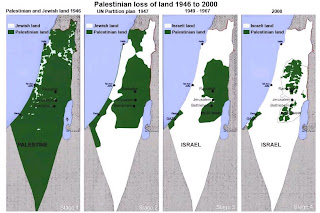
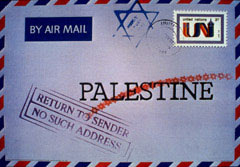
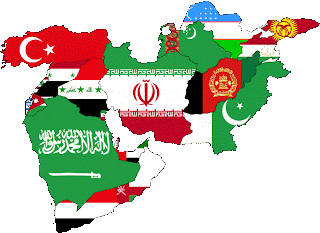
_______
ALL EVENTS FOR THE 2008 FESTIVAL WILL BE HELD AT
ZEITGEIST MULTIDISCIPLINARY ARTS CENTER
1618 ORETHA CASTLE HALEY BLVD.
(across the street from Cafe Reconcile in the Saturn Screen Printing Building)
www.zeitgeistinc.net
_______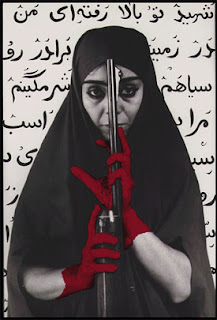
2008 FESTIVAL SPONSORSHIP:
The second annual NEW ORLEANS MIDDLE EAST FILM FESTIVAL plans to be even bigger and better. We are expanding our definition of the "Middle East" to also include segments of Northern Africa and the Mediterranean. We will also be programming Middle Eastern music and performance events for after the films and working to have a variety of Middle Eastern books, CDs, DVDs and crafts along with nightly catered cuisine for sale to make the Festival all the more festive.
To help us put it all together, we need your help. Become a Festival sponsor.
You can purchase an advanced Festival pass for only $100 or $150 for a couple (includes admission to all festival events, a festival t-shirt from Saturn Screen Printing, reserved seating up to 5 minutes before showtimes and discounts on your concessions).
You or your business can sponsor a film for a donation of $200 or $250 (contact Rene for a list of films in need of sponsorship) or sponsor the festival for a donation of $500, $1000 or more.
Sponsors get free festival passes, their logo and/or name on all festival printed literature and merchandise, free festival t-shirts, reserved VIP seating up to 5 minutes before showtimes, ability to table or sell merchandise during the festival and your logo/acknowledgement on the festival trailer and website.
please contact Rene Broussard at:
Zeitgeist
Multi-disciplinary Arts Center, 1618 Oretha Castle Haley Blvd. New Orleans, LA 70113
(504) 352-1150 cell (504) 592-3220 office (504) 827-5858 www.zeitgeistinc.net zte@bellsouth.net
___________________________________
PHOTOGRAPHY EXHIBITION CURRENTLY ON VIEW AT ZEITGEIST THROUGH THE END OF THE MIDDLE EAST FILM FESTIVAL:
40 to 67 / Active Stills
On view through August 10, 2008
An independent collective of Palestinian and Israeli photographers present 34 images from four Palestinian cities occupied by Israel:
Hebron, Jerusalem, Bethlehem & Gaza.
ActiveStills operates in Israel and Palestine and focuses on social and political documenting, projects production, publications and open exhibitions at topics in which the public is not exposed in its daily informative routines, managed by the established media.
For the Palestinians it is 40 Years of Occupation since the territories were occupied in 1967 and for Israel it is a victory celebration of the six day war which multiplied Israel's area threefold and was seen as the greatest success Israel could hope for. Is it truly a victory? Who are those who still pay the price for it? As victory celebrations are held in Israel the only narrative is that of the greatness and heroism of the state, while in fact settlements continue to expand on Palestinian land whose owners have been expelled. Millions of people live in a reality of imprisonment, oppression, dispossession, humiliation and denial of basic human rights. That reality is a mirror to Israeli society, an image it refuses to see. Those are the achievements of the war.
Local www.activestills.org contact:
Leo Gorman (504) 616-1777 lgorman1@hotmail.com
On view 30 minutes prior to all of Zeitgeist’s nightly programming and during the day via appointment. (504) 827-5858.
__________________________
2007 Schedule: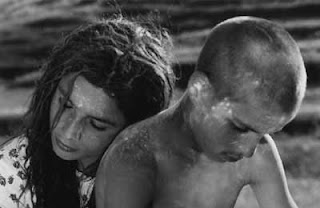
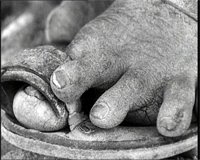
JANUARY 19 through 28, 2007
ZEITGEIST PRESENTED THE FIRST EVER
NEW ORLEANS MIDDLE EASTERN FILM FESTIVAL
In any writing or screenwriting class you quickly learn that the most important element to any good story is conflict. In the Middle East, conflict is a more abundant natural resource than even oil. This first time festival, presented by ZEITGEIST MULTI-DISCIPLINARY ARTS CENTER, without any grants or public funds, features 41 films never screened before in New Orleans from throughout the Middle East. Curated by Rene Broussard, this remarkable program of films explores the extremely rich and complex history, politics and culture of this volatile region. Then, to round things off to an even 42, the festival is immediately followed by a weeklong exclusive, theatrical engagement of the award-winning documentary IRAQ IN FRAGMENTS by James Longley.
Sponsored by and special thanks to NEW ORLEANS PALESTINE SOLIDARITY, NEW ORLEANS HUMAN RIGHTS DELEGATION, CHARITABLE FILM NETWORK, WORLD HEALTH ORGANIZATION: WEST BANK AND GAZA, RAMATTAN NEWS AGENCY, and WWW.ARTEEAST.ORG
Admission was $7 general / $6 students & seniors / $5 Zeitgeist members per film
Zeitgeist Patron members got in free to all films.
Day passes were available for only $10 or $12 on Saturdays or Sundays.
Festival passes were only $50 per person/$75 per couple.
featuring
LENS ON SYRIA: THIRTY YEARS OF CONTEMPORARY CINEMA
a groundbreaking exploration of Syrian cinema presented by ARTEAST, which is currently touring North America. The program showcases over 30 Syrian feature films, documentaries and shorts, many screening for the first time in the US, several of the films have been digitally remastered and subtitled in English for the series. Curated by Rasha Salti,
Debuting at New York's prestigious Lincoln Center from May 5th-18th 2006, the series has already been scheduled to travel to The Gene Siskel Film Center in Chicago; The Canadian Film Institute in Ottawa; The Pacific Cinematheque in Vancouver; The Museum of Fine Arts in Boston; The Pacific Film Archives in Berkley (organized in collaboration with The San Francisco Arab Film Festival); The Georgetown University in Washington, DC; The Northwest Film Center in Portland, Oregon and Zeitgeist Multi-disciplinary Arts Center in New Orleans.
Often described as Arab cinema's “best kept secret”, ArteEast's Syrian cinema series provides an unprecedented opportunity for audiences throughout North America to discover a politically timely and relevant program, ranging from nonfiction films and comedies to political dramas and historical epics, all representative of one of the richest--albeit lesser-known--of world cinemas. Many of the original prints have been restored, digitized, and subtitled in English especially for this touring program. Films in the series are listed with an * before the date and time.
* Friday, January 19 @ 7:30 p.m. (Syria)
SACRIFICES (SUNDUQ AL-DUNYA) by Oussama Mohammad (Syria/France, 2002, 113 min, Color, DVD) A fantastic and visually captivating cinematic fable, Sacrifices reflects on how violence and power legitimize themselves, producing rituals and a vocabulary to perpetuate themselves. It portrays the life of a large family held together by the absolute power of its patriarch, the grandfather, who fertilized the land, started the family, built the house and planted a large tree around which their lives revolve. The film opens as the grandfather is dying, and the family surrounds him in anguish and uncertainty. Life begins with death, young men are born as the patriarch expires, and fathers and heroes come back from the war only to dissolve into mud. Selected at Cannes Film Festival's “Un Certain Regard”.
__________
Friday, January 19 @ 9:30 p.m. (Palestine/Israel)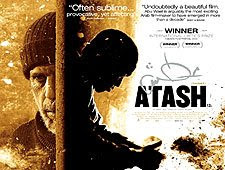
ATASH (THIRST) by Tawfik Abu Wael. Winner of the International Critics’ Prize at the Cannes Film Festival, this beautiful and powerful debut feature from the brilliant young Arab filmmaker, Tawfik Abu Wael, is also an important groundbreaking collaboration between a Palestinian writer/director and an Israeli producer, financiers and crew - the first of its kind. Abu Shukri and his family have settled alone in a valley far from their home town. Tyrannical father Shukri, rules the home with an iron fist, forcing his wife and three children to burn fires all day to make charcoal. When he decides to build a pipeline to bring fresh water to their home, it awakens their instinct for freedom, but carries with it tragic consequences for the entire family. Featuring haunting music, stunning cinematography, and incredibly moving performances from the non-professional cast, Atash is a complex, assured and vivid first feature from an exciting filmmaker, and one to watch for the future.
___________
* Saturday, January 20 @ 5:00 p.m. (Syria)
BEFORE VANISHING (QABL AL-IKHTIFA’) by Joude Gorani (Syria/France, 2005, 20 min, Color, DVD) In Before Vanishing, filmmaker Joude Gorani travels from the beginning to the end of the Barada river that surrounds the capital city of Damascus. Often deemed iconic of nature's wondrous beauty, we discover how the Barada river has suffered from exploitation, neglect, pollution and unplanned urbanization. The film also uncovers the transformation of the river's social life and provides an intelligent measure of the distance between ideology and reality in contemporary Syria. EVERYDAY LIFE IN A SYRIAN VILLAGE (AL-HAYAT AL-YAWMIYYAH FI QARYA SURIYYAH) by Omar Amiralay. (Syria, 1974, 90 min, b&w, DVD) The first documentary to present an unabashed critique of the impact of the Syrian government's agricultural and land reforms, Everyday Life in a Syrian Village delivers a powerful jab at the state's conceit of redressing social and economic inequities. Interviews with farmers, health workers and a police officer contrast the peasants’ regard for the state with the mindset of state representatives toward those peasants. Sa'adallah Wannus, a prominent Syrian playwright and essayist collaborated with documentary pioneer Amiralay on the project. The film remains banned in Syria.
__________
* Saturday, January 20 @ 7:00 p.m. (Syria)
THEY WERE HERE (INNAHUM KANU HUNA) by Ammar el-Beik (Syria, 2002, 12 min, Color, DVD) Coming to terms with the end of the industrial era, They Were Here is an elegant and eloquently composed study that reverberates with lives lived, fading images and relics of retrospection. El-Beik makes a tightly drawn piece about public space, private contemplation and an ephemeral sensibility. THE NIGHT (AL-LEYL) by Mohammad Malas (Syria, 1992, 125 min, Color, DVD) The Night is set in the village of Quneytra, which borders on the Golan, a key battlefield in the 1967 war between Syria and Israel. We are led to the grave of the filmmakers’ father, an old Syrian fighter who joined the volunteer armies in Palestine in the Great Revolt of 1936. Trying to exorcise feelings of shame and humiliation that have long accompanied the image of his father and the village occupied by Israelis during the war of 1967, Malas tries to restore his father's history and give him a more honorable death. But tracing the outline of a memory tortured by burning questions finds only bitter answers. The film is Malas' second feature, often perceived as the ‘prequel’ to his first, equally visually stunning, Dreams of the City. The film earned five awards, including, The Golden Tanit at the Journées Cinématographiques de Carthage, in Tunisia in 1992, and the Silver Palm at the Valencia Film Festival, Spain, 1993.
__________
* Saturday, January 20 @ 9:30 p.m. (Syria)
STARS IN BROAD DAY (NUJUM AN-NAHAR), by Oussama Mohammad (Syria, 1988, 115 min, Color, DVD) A double wedding in a small village turns to high drama when one bride runs away and the other refuses to go on with her marriage. The drama unveils the fragile balance holding together a family strained by an abusive father now replaced by the successful but corrupt eldest son, a pathologically enraged second son, and the troubles of the youngest son, rendered deaf by a violent blow his father dealt him as a child. Ultimately tragic, the film is rife with biting humor and sharp political critique as it exposes how the violence of arbitrary and absolute power in a patriarchal society seeps into the unit of a family. Stars in Broad Daylight, Ousama Mohammad's first feature, remains banned from screening in Syria because of its subversive representation and critical voice. Selected at the “Quinzaine des Réalisateurs” at the Cannes Film Festival in 1988.
__________
Sunday, January 21 @ 5:30 p.m. (Egypt)
NAGUIB MAHFOUZ
THE PASSAGE OF THE CENTURY by Francka Mouloudi. In 1988, Naguib Mahfouz, "who, through works rich in nuance—now clear-sightedly realistic, now evocatively ambiguous—has formed an Arabian narrative art that applies to all mankind," was awarded the Nobel Prize for Literature. He was the first and is still the only Arab Nobel Laureate for Literature. At the end of the 20th century Mahfouz granted filmmaker Francka Mouloudi rare access to make this revealing documentary with and about him. At the age of 88, half-blind, hard of hearing, and crippled by a recent assassination attempt, Mahfouz is remarkably lively, witty and lucid. Author of the acclaimed Cairo Trilogy, The Harafish, Arabian Nights and Days and many other novels and collections of short stories, Mahfouz weaves the threads of his life together with his view of society, his childhood, his discovery of literature (Egyptian and Western), the city of Cairo (which he left only three times in his life), Islamic fundamentalism, the evolution of Egypt, the role of women, and the future of civilization.
____________
Sunday, January 21 @ 6:30 p.m. (Egypt)
FOR THOSE WHO SAIL TO HEAVEN by Elizabeth Wickett. At the climax of the annual Opet festival in ancient Luxor, the barques of ancient Theban gods were pulled from Karnak to Luxor and then sailed back on the "waters of inundation." Today, the descendants of Luxor's patron saint, Sheikh Sidi Abu'l Hajjaj, continue this ancient ritual. In For Those Who Sail To Heaven, the families which pull the sheikh's boat describe the many Sufi rites captured in the film, including "zikr," the whirling to flutes and drums to achieve the ecstatic state called "malbus," and "mirmah," equestrian games which rekindle the spirit of battles fought long ago. In their eyes, these rites constitute an ancient legacy which they are bound to preserve. Through them, this acclaimed documentary provides a glimpse of a unique living history.
____________
Sunday, January 21 @ 7:30 p.m. (Lebanon)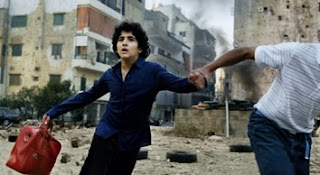
ZOZO by Josef Fares. Set in Beirut, Zozo is just on the cusp of adolescence and his home and life are teetering on the brink of destruction. Far too young to deal with the Lebanese civil war that is raging outside his door, he does what any smart boy facing his reality would - he runs. Left orphaned, hungry and adrift by shells and gunfire, Zozo sets off to the only other place he knows - Sweden, where his paternal grandparents emigrated years before. He has never visited the country, but Zozo has strong images in his mind of the lush, green and peaceful Eden it must be, and these dreams draw him there on a remarkable journey. Yet it is the life he finds after he is finally reunited with his grandparents that provides his greatest challenges. Despite the obvious barriers of culture and language which, like most immigrant children, Zozo conquers rapidly and joyfully, it is the burden of his memories and the primal hunger for security that haunt him at every turn. His grandparents are "old school" and feel the best way to deal with loss is to deny it. The other schoolchildren cannot possibly have any sense of what he has been through and, in a sad irony, he finds himself at the receiving end of more senseless aggression from a sadistic schoolyard bully. How Zozo manages to reconcile his past with the hope of a brighter future is a riveting story, beautifully composed by filmmaker Josef Fares. Winner of both the Adult and Children’s Jury Prizes at the Chicago International Children’s Film Festival.
____________
Monday, January 22 @ 7:30 p.m. (Iran)
INSIDE OUT by Zohreh Shayesteh. Maria is a middle-aged single woman with three children. Saman is a newly married young man. Arash is an eighteen-year-old high-school dropout. The one thing they have in common is that all three are transsexuals living in the Islamic Republic of Iran. INSIDE OUT features intimate conversations with Maria (a male-to-female transsexual), Saman (female-to-male) and Arash (female-to-male), allowing them to tell their stories, including the lifelong struggle to come to terms with their gender dysphoria, how this mind/body conflict has affected their everyday behavior, and the impact of hormone therapy and sex-change surgery on their lives. The film also includes revealing interviews with a Muslim cleric, who explains that the majority of Iran's religious leaders consider transsexuality to be a human rights issue and therefore support gender reassignment surgery; a psychiatrist, who explains the difference between homosexuality and transsexuality and how the condition cannot be cured psychologically; and a surgeon, who discusses the nature and the difficulties of the required surgery. INSIDE OUT also documents daily activities of the three individuals, showing how they are coming to terms with their new identities and the related emotional and physical transformations. These difficulties clearly pale compared to their former agony. As Maria, a 44-year-old father and former truck driver, states, "Only a person who has felt this pain can understand it." Thanks to this sensitive and insightful documentary, however, the rest of us can begin to understand the nature of this serious but still little-understood condition.
___________
Monday, January 22 @ 8:30 p.m. (Canada/Israel/Palestine)
ZERO DEGREES OF SEPERATION by Elle Flanders. This multi-award winning documentary examines the unique and complex relationship between two sets of lovers and two nations, less than 3 kilometres apart. Selim and Ezra, a gay Palestinian-Israeli couple, are fighting for the right to live together in Jerusalem . Edit and Samira, a lesbian Palestinian-Israeli couple, are trying to figure out how to bridge the divide between their cultures - often so close and yet so far. Through the lives of these two couples we gain a unique perspective on the Middle East conflict. Interwoven with archival footage belonging to director Elle Flanders' grandparents, Zero Degrees of Separation takes on the larger questions of humanity, conflict and nationalist aspiration. Existing on the margins of their societies, the couples allow us a unique perspective of individuals who cross borders daily, sometimes physically, sometimes metaphorically, defying the notion of an eternal conflict with impermeable borders.
___________
* Tuesday, January 23 @ 7:30 p.m. (Syria)
STEP BY STEP (KHUTWA KHUTWA) by Oussama Mohammad (Syria, 1977, 25 minutes, Black and White, DVD) Each day children trudge the muddied village paths to go to school, but as Step by Step makes painfully clear, their only real escape from crushing poverty is to join the army. A frightening, captivating and insightful portrait of how the Baath regime transformed generations of peasants into citizen-soldiers and sent the poor in droves to provincial cities as migrant laborers. This short film was Mohammad's graduation project at the VGIK film school and foretells his cinematic style and thematic obsession with the language of violence in society. A PLATE OF SARDINES (OR THE FIRST TIME I HEARD OF ISRAEL) by Omar Amiralay (Syria/France, 1997, 18 min, Color, DVD) The first time I heard of Israel, I was in Beirut, the conversation was about a plate of sardines. I was six years old, Israel was two. In the company of filmmaker Mohammad Malas, Omar Amiralay revisits the ruins of the destroyed village of Quneytra. THERE ARE MANY THINGS LEFT I WOULD LIKE TO SAY... (HUNAK ASHIYA’ KATHIRA...) by Omar Amiralay (Syria/France, 1996, 50 min, Color, DVD) A few months before the passing of his friend and close collaborator dramaturge Sa‘adallah Wannus, Amiralay listens to his friend's somber and relentless words, a farewell to a generation for whom the Arab- Israeli conflict has been the source of all disillusion.
___________
* Tuesday, January 23 @ 9:30 p.m. (Syria)
JUST GET MARRIED! by Husam Chadat (Syria/Germany, 2003, 20 minutes, Color, DVD) Hilarious and heartwarming, Just Get Married! tells the story of Mr. Sharif, a Syrian living in Germany, whose student visa has finally run out. Desperate to find a way to stay in the country he has come to love, his futile attempts find him revisiting past girlfriends, responding to personal ads, and pleading with strangers. Eventually he learns that home is where you make it. VERBAL LETTERS (RASA’EL SHAFAHIYYAH), by Abdullatif Abdul-Hamid (Syria, 1991, 105 min, Color, DVD) Set in the bright orange groves of a small village in the Syrian countryside, Verbal Letters has earned Abdellatif Abdul-Hamid frequent comparisons to French author Marcel Pagnol (Jean de Florette, Manon des Sources). The film, about love friendship, loyalty and the magic of the first kiss, is loosely adapted from the story of Cyrano de Bergerac. A young man with an oversized nose is too embarrassed to approach the beautiful young woman he has fallen deeply in love with. He dispatches his most trusted friend to recite to her his love letters, but she falls for the friend. The film is an ode of tenderness and humor to childhood, coming of age, the enchantment of the first love, and the pains of learning multiplication tables.
___________
Wednesday, January 24 @ 7:00 p.m. (Palestine)
A RETROSPECTIVE OF FIVE SHORT DOCUMENTARIES BY PALESTINIAN FILMMAKER ABDEL SALAM SHEHADA. Based out of Ramallah, working for the Ramattan News Agency, more than anyone else, this award-winning documentary filmmaker daily chronicles the lives and events of the Gaza Strip. Featuring: DEBRIS (RADM), A Palestinian family’s land, once covered with olive trees and crops, is bulldozed by Israeli forces. But Debris is also a fantasy: of dreams to fly far away in order to touch the sky, to break free from the despair of reality. (2001); THE CANE, This documentary tackles the issue of corporal punishment of children in Arab society (2000); NEAR TO DEATH, (1997); LITTLE HANDS, a documentary that tells the story of three children—one killed, one kidnapped and one forced to walk through Israeli security to get to school. (1996); and THE RAINBOW, documents the killing, structural devastation in Rafah, caused by Israel’s “Operation Rainbow” in May 2004 and how children were directly targeted by Israeli snipers (2004).
____________
* Wednesday, January 21 @ 9:30 p.m. (Syria)
THE CHICKENS (AL-DAJAJ) by Omar Amiralay (Syria, 1977, 40 minutes, Black & White, DVD) Produced by Syrian television, this film too remains banned in Syria. Under the guise of documenting chicken farms, the filmmaker delivers a scathing critique of his government, and foretells the massive failure of its policies that have brought poverty and hunger to its people. FILM-ESSAI ON THE EUPHRATES DAM (MUHAWALAH ‘AN WADI AL-FURAT) by Omar Amiralay (Syria, 1970, 10 minutes, b&w, DVD) This first film by the veteran documentary filmmaker Omar Amiralay follows the construction of a dam on the Euphrates river that is supposed to bring tremendous improvement in the lives of villages around it. A FLOOD IN BAATH COUNTRY (AL-TAWFAN) by Omar Amiralay (Syria/France, 2003, 46 min, Color, DVD) In 1970, Omar Amiralay made a short documentary, Film-Essai on the Euphrates Dam, in praise of the ruling Baath party's project to construct an impressive system of dams. Today, after fatal construction flaws have been discovered, his controversial new film explores the metaphorical implications of such weakness. Without commentary or criticism, Amiralay's film exposes Baath party propaganda and its debilitating effects on the people of al-Mashi village, 400 kilometres (250 miles) northeast of Damascus. The camera moves slowly from students to teachers to government officials, with everyone reciting the exact same praises for the president and slogans glorifying the Baath party. The film is the harshest indictment yet of the regime, portraying the devastating effects of 35 years of rigid Baath party rule on Syrian society.
_____________
Thursday, January 25 @ 7:30 p.m. (Iran)
BORDER CAFÉ by Kambozia Partovi. Reyhan, an Iranian widow and mother of two young children, reopens the roadhouse formerly run by her husband. But since running such a business is taboo for women, she encounters much resistance, particularly from her conservative brother-in-law, Nasser, whose only aim is to marry Reyhan despite already having one wife. Reyhan refuses this marriage proposal since she would only marry for love and not tradition nor convenience, and so Nasser seeks a way to close the roadhouse in an effort to make Reyhan dependent to him. An amorous Greek trucker named Zakariyo provides our heroine with a possible exit from this difficult situation, but ultimately the fate of Reyhan and her roadhouse, which has become quite successful under her management, is decided by a local court, and the verdict leaves Reyhan pondering her place in the world.
____________
Thursday, January 25 @ 9:30 p.m. (Iran)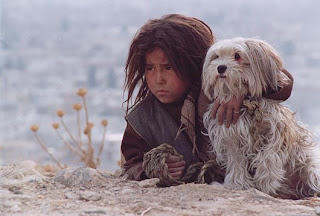
STRAY DOGS by Marziyeh Meshkini. In Marziyeh Meshkini's beautifully crafted and moving insight into post-Taliban Afghanistan, two children, a brother and sister, rescue a stray dog on the streets of Kabul. That evening they visit the jail where their mother is a prisoner and, since her children have nowhere to live, they are permitted to stay with her at night. But the following morning, they are thrown out: prison is for criminals, not homeless orphans. Desperate to return to the jail, brother and sister attempt a series of robberies, but each seems doomed to failure until a fugitive seems to offer an unusual solution: the movies. They can learn to steal from watching Hollywood films; alternatively, European cinema can teach them how to get caught.
_____________
Friday, January 26 @ 7:30 p.m. (Isreal)
PAPER DOLLS by Tomer Heymann. Throughout the world, struggling people cross borders illegally to find work and make a better life for themselves: Mexicans in the US, Turks in Germany and North Africans in France. But only Israel has a population of illegal Filipinos of indeterminate gender who care for the elderly Orthodox – and for whom they often become substitute children. PAPER DOLLS follows five such men, refugees from families that reject them, who’ve made a home in Tel Aviv, Israel’s most swinging city. Fast friends, they spend their free time on stage, as the drag queen ensemble, Paper Dolls. A multiple-prize winner at the most recent Berlin Film Festival, the film takes a thoughtful, variously humorous and poignant look at people whose very lives redefine conventional notions of gender, family and love. “A tender study. The openly gay Heymann becomes, both hilariously and wistfully, part of a community that possesses in spades what’s missing in his own life – the gift of happiness and living well in unfriendly surroundings.” – Ella Taylor, Village Voice
_____________
Friday, January 26 @ 9:30 p.m. (Israel/Palestine)
STORIES FROM THE MIDDLE EAST. Four short films, two sides of a conflict, one mutual project initiated by The World Health Organization. This film examines the effects of the current conflict on the physical, mental and social wellbeing of Palestinian and Israeli people. Specially recalling the WHO definition of health: "Health is a state of complete physical, mental and social well-being and not merely the absence of disease or infirmity" (WHO Constitution 1948). Featuring: THE MALL by Jonathan Ben Efrat. An abandoned shopping mall in Geha Junction is the home of hundreds of Palestinians, illegal workers who find refuge here. MISSING GAZA by Sobhi al-Zobaidi. A group of Gazans living in Ramallah are meeting for lunch in a friends’ house to talk about the people and the places in Gaza, whom they miss so much. POWER by Ayelet Bechar. In the Bedouin Village of Arab El Sawaed in the north of Israel there are homes built and roads paved by the people themselves but no basic services such as electricity or running water. JOURNEY WITH NABA' by Hanna Musleh. The film takes us through the complexity of life in the Dheisheh refugee camp through the story of Naba, a 12-year-old boy on his way to meet his imprisoned brother.
______________
* Saturday, January 27 @ 5:30 p.m. (Syria)
THE WASH by Hisham el-Zouki (Syria/Norway, 2005, 8 minutes, Color, DVD) Taking the dirty laundry takes on new meanings in The Wash. Two immigrants in Norway, working as cleaners for a company entrusted to prepare the site for the visit of the U.S. president, are suddenly thrown into disarray when blood begins to drip from the U.S. flag hanging high on its mast. The Wash is crafted like a caustic allegorical fable about perceptions of the U.S., and leaves the viewer with an open-ended field of interpretation. THE POT (AL-QARURA)) by Diana el-Jeiroudi (Syria, 2004, 20 min, Color, DVD) A short unconventional documentary, The Pot creates the space for women to express themselves freely about being pregnant in the shadow of a society that still regards their bodies as a vessel to carry progeny. BLUE GREY by Mohamad el-Roumi (Syria/France, 2003, 23 minutes, Color, DVD) Filmed in northern Syria, in the region known as the upper Euphrates, the filmmaker treks the reverse trajectory that carried him as a child and his family, on the ferry crossing the Euphrates, as they migrated to the city of Aleppo. The villages he returns to, have now vanished with the construction of the artificial lake of Tishreen. With tenderness and melancholy the film bids farewell to a life right before its vanishing, it carries the sorrow of people in the moment preceding their uprooting and displacement. THE DREAM (AL-MANAM) by Mohammad Malas (Syria, 1981, 45 min, Color, DVD) Filmed in Sabra and Shatila, Palestinian refugee camps in Lebanon, shortly before the massacre in 1982, this documentary's principle reference is dreams, and not lived reality. It plays on this double register, where women, children, elderly and combatants speak the reality of their everyday, transposed eerily, in dreams, nightmares and premonitions. Ultimately they converge on what the Palestinians have lost: their homeland and a life with dignity.
_____________
Saturday, January 27 @ 7:30 p.m.
MOKARRAMEH, MEMORIES AND DREAMS by Ebrahim Mokhtari. Mokarrameh, a widow in a rural Iran, once owned a beloved cow. She had to seek grass on a long and tiring walk to feed the animal. One day her children sold the beast without telling her. Overcome by sorrow, she began to paint. Mokarrameh made her first painting (a portrait of the cow) with mud and cow dung on a rock as a means to find consolation for its death. She painted on the walls of her house, on pumpkins, on whatever surfaces she could find until one of her sons, on his monthly visit from Tehran, brought her paper and paint. From that day Mokarrameh has painted tirelessly. Now her home overflows with her colorful work, in which local life, legends and memories are vividly depicted. All of Mokarrameh's paintings tell a story. Some tell the story of her life, the stories of other wives of her husband, or of other women in the village. Interwoven are bittersweet tales; bickering between wives about their husband-in-common, and Mokarrameh's confrontation with her uncle about why she was sold into marriage at such a young age. Mokarrameh's paintings represent a mingling of reality and her imagination, providing rare insight into the lives of women in Iran.
_____________
Saturday, January 27 @ 8:30 p.m. (Turkey)
WHAT’S HUMAN ANYWAY? by Reha Erdem. Set in an urban apartment building in modern day Istanbul, where neighbors, friends and family are living in close quarters, the film focuses on male protagonists through whom the three phases of stepping into manhood in Turkish society are explored. Ali, suffering from temporary amnesia, is the main focus for the narrative twists in this circus-like environment, but there is also a little boy who refuses to be circumcised, a young man who refuses to do his military service, and a 30-year-old bed-wetter refusing to leave home.
______________
Sunday, January 28 @ 5:30 p.m. (Canada/Israel)
SURREAL: A GLANCE AT A LAND THAT NO LONGER EXISTS by Erez T-Yanuv Barzilay. At first glance, it seems almost normal. But look further, the villages are nearly empty, the flags are ripped, the produce rotting. This is the Gaza Strip, one month before the destruction of the Israeli villages. The 20 settlements are almost silent as they form the unlikely backdrop and the focus of a Canadian road trip. Both former Israelis, two old friends decide to take a farewell journey. What can they find there? Filmmaker Erez T-Yanuv Barzilay's panoramic digital footage contrasts with Dror Marcus' still photographs, just as the disbelief of the villagers still left juxtaposes with the smiles of innocent Palestinian children. Music by Canadian Ben Euerby sets the score for what is truly a strange journey. Surreal: A Glance at a Land That No Longer Exists offers us a look past the news clips, the soldiers, and the concrete barricades, with a glance at lost possibilities and living hopes. The Gaza settlements are gone - this time and place exists only on film and in memories.
______________
Sunday, January 28 @ 7:30 p.m. (Yemen)
A NEW DAY IN OLD SANA’A by Bader Ben Hirsi. In this achingly romantic tale, handsome young Tariq is about to marry Bilquis, eldest daughter of a prominent and powerful judge. But as he wanders the ancient city of Sana'a late one night, he spots a beautiful young woman dancing in the street and falls madly in love with her. Before long, the young groom must choose between following his heart and protecting his family's honor. Filmed entirely on location in the ancient city of Sana'a, this exquisite film is the first feature ever to come out of Yemen.
______________
Sunday, January 28 @ 9:30 p.m. (Palestine/Israel)
Hothouse by Shimon Dotan. Straight from it’s U.S. Premiere at Sundance where it is in competition, Hothouse is our Official Closing Night Film. Almost ten thousand Palestinians, designated by the Israeli government as "Security Prisoners," are incarcerated in Israel today. Most Israelis consider them murderers and criminals, but most Palestinians regard them as freedom fighters. Granted rare permission to film inside the country's highest security facilities, Israeli filmmaker Shimon Dotan shows everyday prison life, including biweekly family visits, internal elections, periodic security searches of cells, and relations between inmates and prison staff. HOTHOUSE also features interviews with many Palestinian prisoners, including those involved in suicide bombings. Although their political demands for an end to the occupation and full rights of citizenship are understandable, the bloodcurdling confessions of these proud, unrepentant and often smiling terrorists expose the moral disconnect required for such inhuman actions. HOTHOUSE also makes it clear that the Israeli criminal justice system uses imprisonment to stifle or control Palestinian democratic political life, revealing that 13 prisoners, who were not involved in terrorist or military actions, were political candidates in the 2006 Palestinian elections, which saw the rise to power of the militant Islamic party, Hamas. In this regard, the film shows how Israeli prisons have become incubators for political education and debate, which often influences Palestinian society at large. The Palestinian experience in Israeli prisons has become a national symbol in Palestine, and the prisons themselves have become virtual universities for Palestinian nationalism, shaping the prisoners' ideology, strengthening their political convictions, and, as was the case on South Africa's Robben Island or in the H-Blocks in Northern Ireland, enabling the development of future political leaders.
Very special thanks again to 
www.arteeast.org
________________________________________________________________________________________
Also @ Zeitgeist, but not part of the N.O. Middle East Film Festival was…
Tuesday, January 30 – Wednesday, February 7 nightly @ 7:30 p.m. 
IRAQ IN FRAGMENTS by James Longley. An opus in three parts, IRAQ IN FRAGMENTS offers a series of intimate, passionately-felt portraits: A fatherless 11-year-old is apprenticed to the domineering owner of a Baghdad garage; Sadr followers in two Shiite cities rally for regional elections while enforcing Islamic law at the point of a gun; a family of Kurdish farmers welcomes the US presence, which has allowed them a measure of freedom previously denied. American director James Longley spent more than two years filming in Iraq to create this stunningly photographed, poetically rendered documentary of the war-torn country as seen through the eyes of Sunnis, Shiites and Kurds. Winner Best Director, Best Cinematography and Best Editing awards in the 2006 Sundance Film Festival documentary competition, the film was also awarded the Grand Jury Prize at the 2006 Full Frame Documentary Film Festival and the award for Best Documentary at the Chicago International Film Festival. Academy Award nominee for Best Documentary Feature 2007.


